
Transtation-KMP
A translation app on Android/Desktop built by Kotlin Multiplatform + Compose Multiplatform, enjoy amazing experience with LLMs' support
Stars: 106
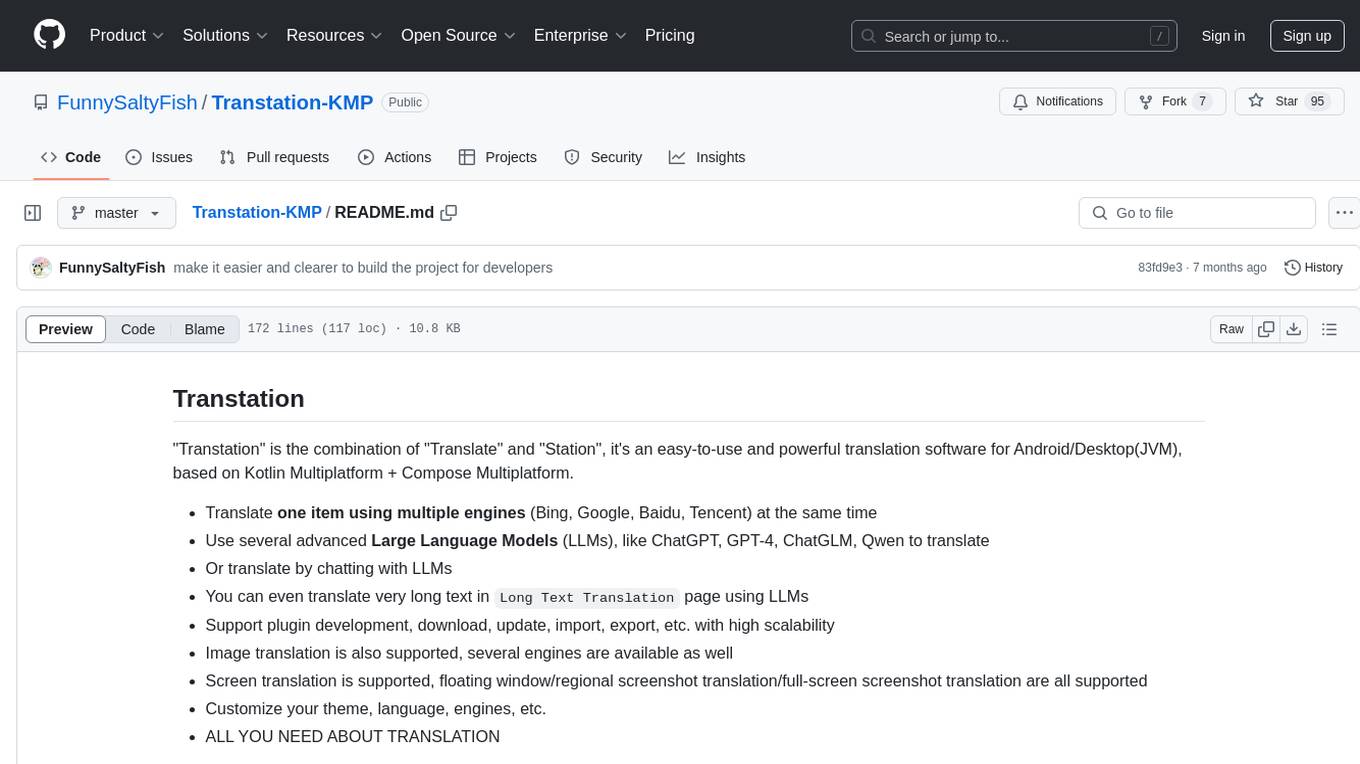
Transtation is an easy-to-use and powerful translation software for Android/Desktop based on Kotlin Multiplatform + Compose Multiplatform. It allows users to translate one item using multiple engines simultaneously, utilize advanced Large Language Models for translation, chat with LLMs for translation, translate long text, support plugin development, image translation, and screen translation. The application is designed for Chinese users and serves as a reference for learning Jetpack Compose or Compose Multiplatform. It features Kotlin Multiplatform, Compose Multiplatform, MVVM, Kotlin Coroutine, Flow, SqlDelight, synchronized translation with multiple engines, plugin development, and makes use of Kotlin language features like lazy loading, Coroutine, sealed classes, and reflection. The application gradually adapts to Android13 with features like setting application language separately and supporting Monet icon.
README:
"Transtation" is the combination of "Translate" and "Station", it's an easy-to-use and powerful translation software for Android/Desktop(JVM), based on Kotlin Multiplatform + Compose Multiplatform.
- Translate one item using multiple engines (Bing, Google, Baidu, Tencent) at the same time
- Use several advanced Large Language Models (LLMs), like ChatGPT, GPT-4, ChatGLM, Qwen to translate
- Or translate by chatting with LLMs
- You can even translate very long text in
Long Text Translationpage using LLMs - Support plugin development, download, update, import, export, etc. with high scalability
- Image translation is also supported, several engines are available as well
- Screen translation is supported, floating window/regional screenshot translation/full-screen screenshot translation are all supported
- Customize your theme, language, engines, etc.
- ALL YOU NEED ABOUT TRANSLATION
Due to the time limit, some of the features are not available in Desktop version yet, but they will be added in the future.
This software is a translation software which mainly serves for Chinese users right now. It is also a open-source project which can be referred to when learning Jetpack Compose or Compose Multiplatform. The project is the KMP version of Transtation, which has been maintained for 4 year in Android platform.
The following are the features of this application:
- Kotlin Multiplatform + Compose Multiplatform + MVVM + Kotlin Coroutine + Flow + SqlDelight
- Multi-module design, with separation between the common module and the project module
- Supports synchronized translation with multiple engines, and supports plugin development, download, update, import, export, etc. with high scalability
- Makes full use of the Kotlin language features, such as lazy loading, class proxy, Coroutine, Flow, sealed classes, extension methods, extension properties, and reflection, etc.
- Based on Rhino JS, it designs and implements a complete JavaScript plugin loading, running, and debugging environment, providing one-stop support for plugin development
- Adapts to Android11 file permissions, adapts to bilingual, dark mode, landscape/tablet pages, and develops, uses and publicly releases four open source libraries
The application gradually adapts to Android13, including:
- Supports setting the application language separately
- Supports Monet icon
You can get the latest version from the following ways:
- Android
- Desktop(JVM)
- Desktop version is still in Alpha test, it can be packaged and installed successfully. Join the QQ Group to download the test version.
If you want to read the code, I recommend that you start from the main Activity
If you find it helpful, welcome to star!
v2.8.0 (2024/01/15)
UI v4:
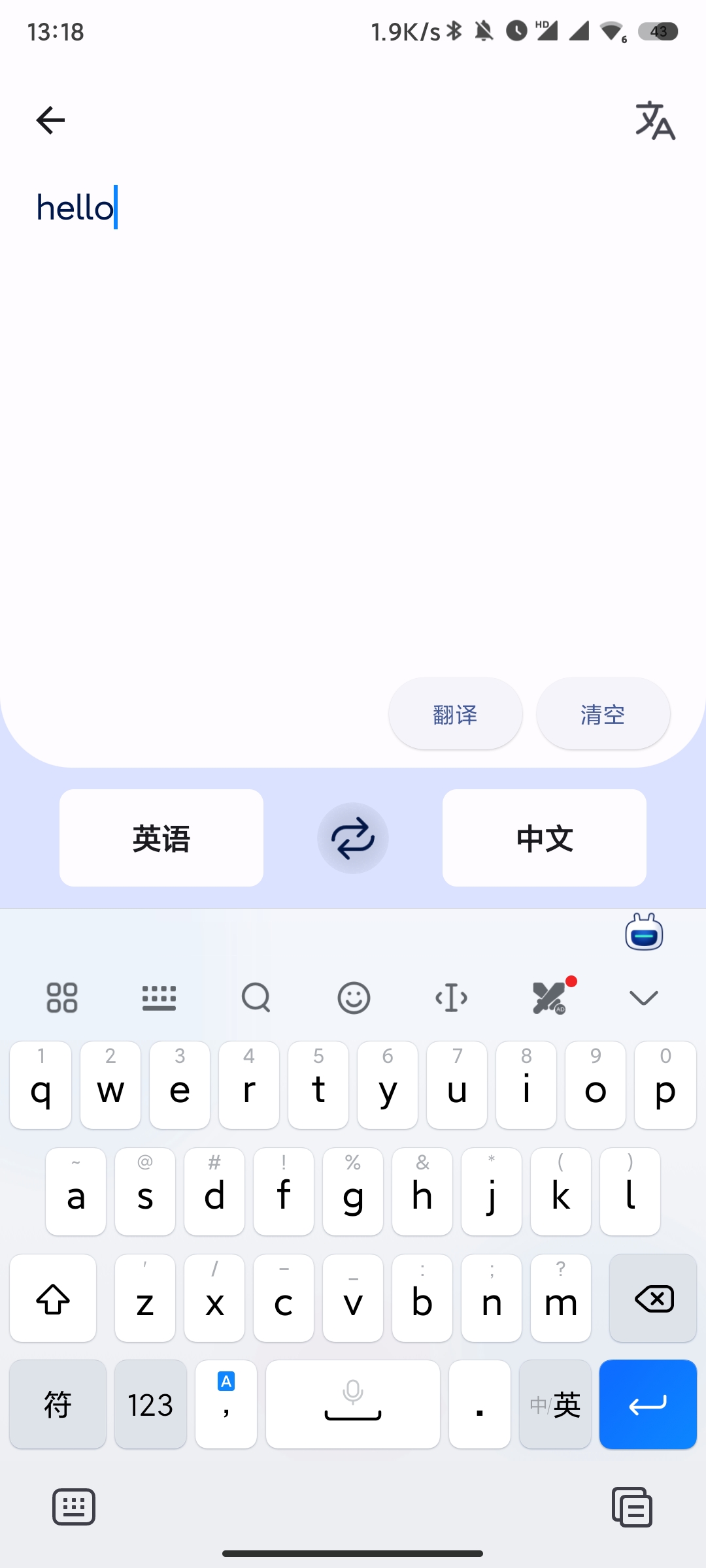 |
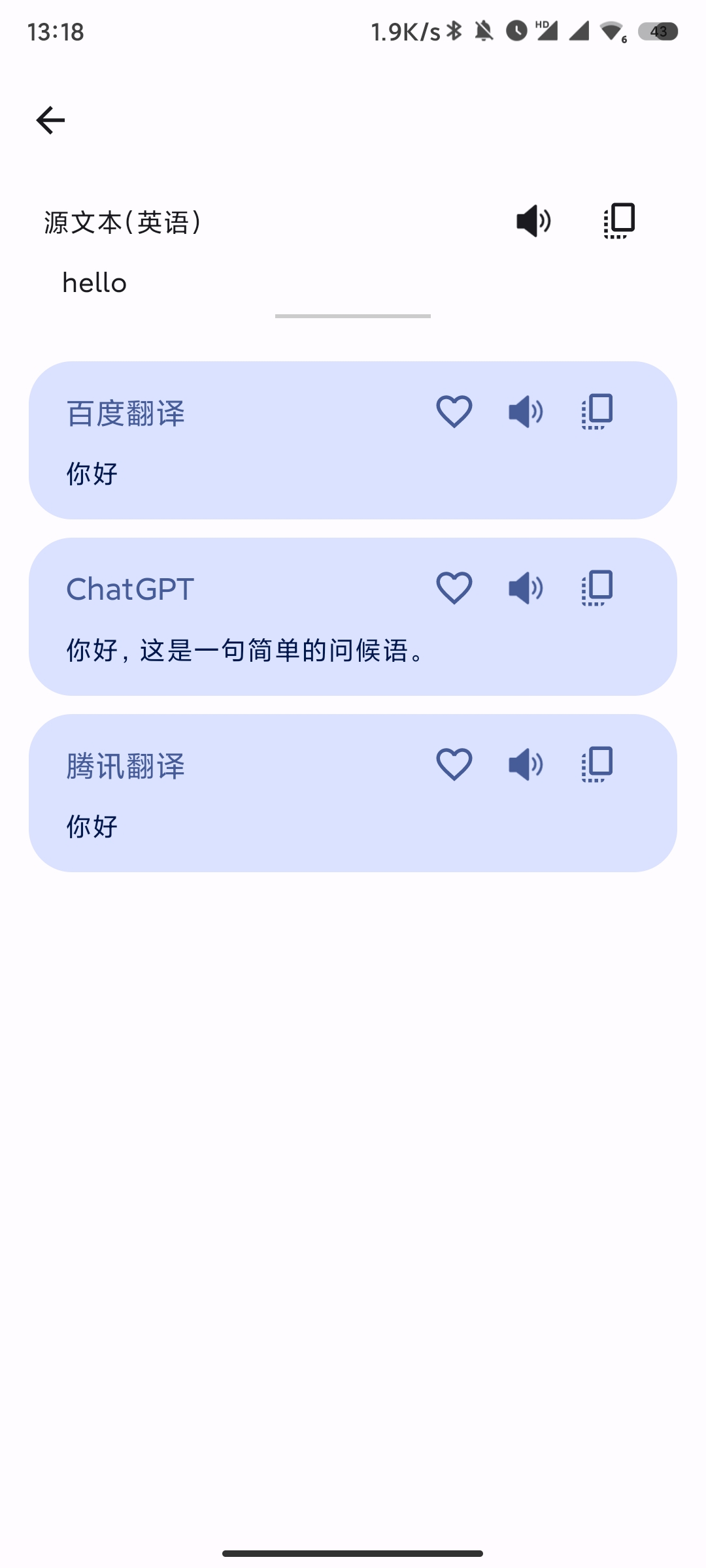 |
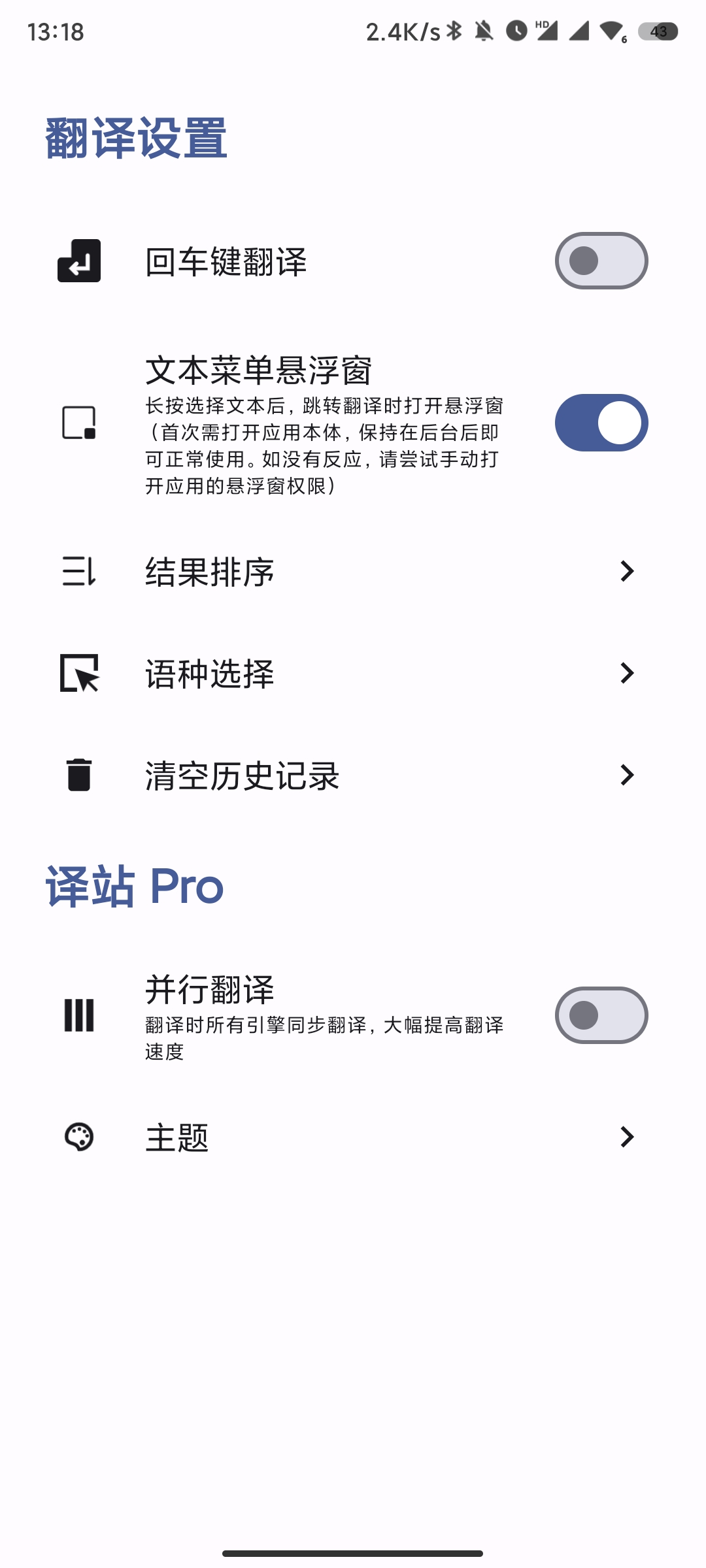 |
 |
 |
 |
 |
 |
- Desktop version is still under development, the UI might change a lot in the future.
| Screenshot | Screenshot |
|---|---|
 |
 |
 |
 |
 |
 |
If you're a developer and want to view the code or build the application, the following might be helpful:
In the initial days of development, I tried using Fleet, Android Studio, and IDEA multiple times to develop this application. In the end, I continued using Android Studio. Its development experience is essentially consistent with IDEA, and Desktop applications can be run directly by clicking a small button. The reasons for not choosing the other two are:
- Fleet: Currently, it seems a bit rudimentary, and it's challenging to bring up various windows (cannot be kept resident), lacks AI completion.
- IDEA: The automatically generated expect/actual positions are very strange. For example, on the Android side, it displays both
androidMainandkotlin.androidMain. Choosing the former has no effect, and choosing the latter generates a file with a name like:Xxx.android.commonMain.kotlin.kt, which is not very reasonable.
I recorded some of the migration process, I suggest you read it if you're interested in it. Because it is too long, I put it to another file:
As an open-source project, you can learn about it from the following aspects:
In terms of code organization, the code here doesn't strictly follow Google's best practices. If you want to pursue elegant code, you can refer to Google's official NowInAndroid project. However, in terms of actual usage, that project's pursuit of unified data flow has led to suboptimal user experience (for example, in the version I experienced, clicking on "Favorite" in any list item would trigger an upstream flow update, refreshing the entire list. This would cause the list to scroll back to the top when you click a favorite button, which clearly doesn't align with the actual user experience).
The code is written following this rule: Composable + ViewModel. Simple logic is implemented directly in Composable, while more complex logic is implemented in ViewModel. For the sake of convenience, the State inside the ViewModel has not adopted the "internal MutableState + externally exposed State" strategy. Instead, all States are mutable, and some are directly accessed through vm.xxx.
However, there are still some basic cleanliness aspects, such as naming conventions, code indentation, and Kotlin-style programming. The main ViewModel files and Composable pages, under AS inspection, achieve full green for the most part, with the majority of yellow Lint warnings ranging from 1 to 5, mostly relating to unused TAG variables or unused functions.
- composeApp: the main translation page
- base-kmp: the basic module, defining basic Beans, and introducing third-party modules in API form for use by other parts
- code-editor: the code editor page
- login: the login and registration page
- ai: LLM related logics
- android-code-editor: editor, language-base, language-universal: code editor View from the open-source project sora-editor
buildSrc: dependency version management
-
You need to use Android Studio version Flamingo or higher, the newest stable version is highly recommended.
-
For security reasons, the open-source part does not include the
signing.propertiesfile containing signature information. If you need to build a release version, please add this file yourself.-
signing.properties
-
located in the root directory
// If you need to build a release package, please add this file yourself in the project root directory /** * STORE_FILE=yourAppStroe.keystore STORE_PASSWORD=yourStorePwd KEY_ALIAS=yourKeyAlias KEY_PASSWORD=yourAliasPwd */
-
-
For Chinese developers, due to the preferred repositories are Google and Maven, you may need to configure the proxy to download the dependencies. Or you can modify the
repositoriesinbuild.gradle.ktsandsettings.gradle.ktsand move the Chinese mirrors to the top.
If you are unable to run it on the latest stable version of Android Studio and the correct Gradle version, and you have confirmed that it is not due to your own issues, feel free to open an issue and ask. It's possible that I missed some files when committing to Git. I will respond as soon as I see it.
- UI design (v3) referenced from 酷安@江戸川コナン (authorized)
- UI design (V4) and promotional graphics from 酷安@松川吖
- Thank you to all the friends who have sponsored the project!
- Thank you to all the contributors!
If this project is helpful to you, welcome to Star it~
For Tasks:
Click tags to check more tools for each tasksFor Jobs:
Alternative AI tools for Transtation-KMP
Similar Open Source Tools

Transtation-KMP
Transtation is an easy-to-use and powerful translation software for Android/Desktop based on Kotlin Multiplatform + Compose Multiplatform. It allows users to translate one item using multiple engines simultaneously, utilize advanced Large Language Models for translation, chat with LLMs for translation, translate long text, support plugin development, image translation, and screen translation. The application is designed for Chinese users and serves as a reference for learning Jetpack Compose or Compose Multiplatform. It features Kotlin Multiplatform, Compose Multiplatform, MVVM, Kotlin Coroutine, Flow, SqlDelight, synchronized translation with multiple engines, plugin development, and makes use of Kotlin language features like lazy loading, Coroutine, sealed classes, and reflection. The application gradually adapts to Android13 with features like setting application language separately and supporting Monet icon.
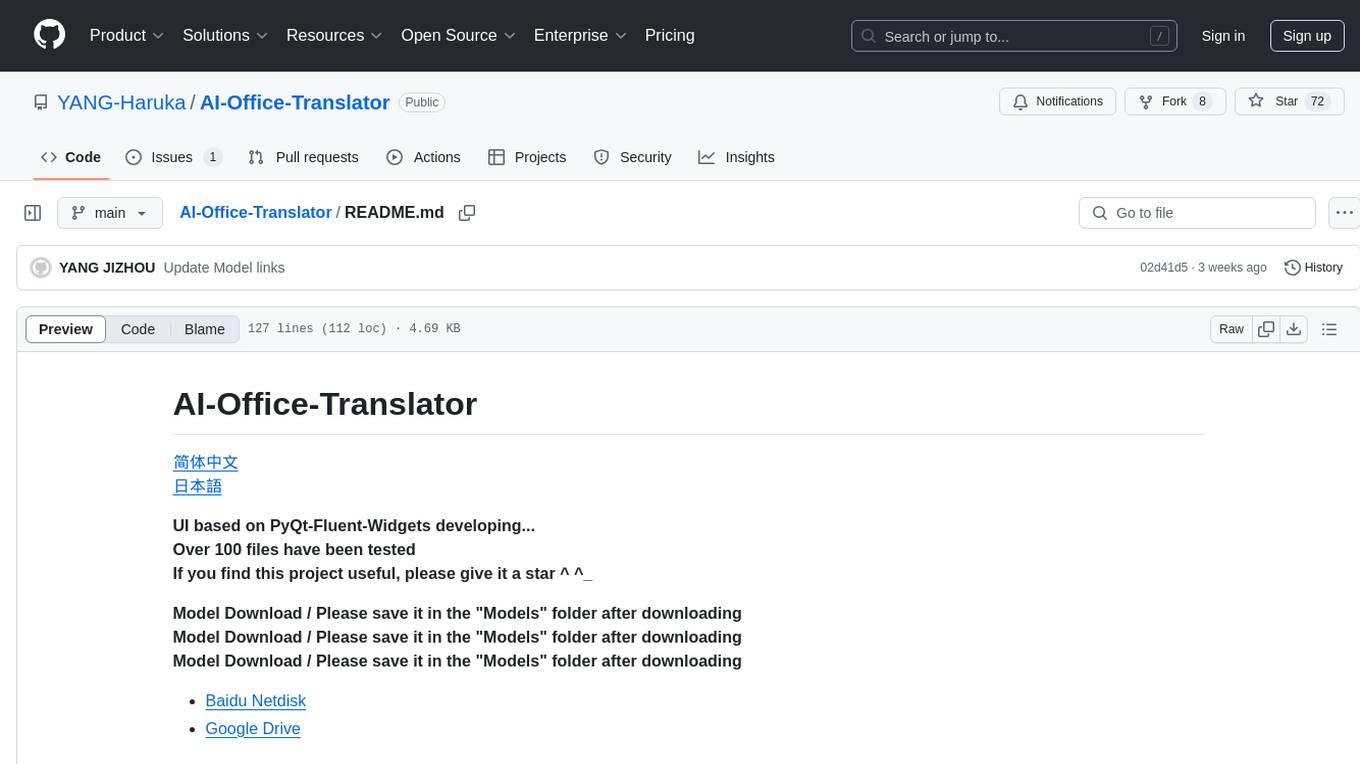
AI-Office-Translator
AI-Office-Translator is a free, fully localized, user-friendly translation tool that helps you translate Office files (Word, PowerPoint, and Excel) between different languages. It supports .docx, .pptx, and .xlsx files and allows translation between English, Chinese, and Japanese. Users can run the tool after installing CUDA, downloading Ollama dependencies and models, setting up a virtual environment (optional), and installing requirements. The tool provides a UI where users can select languages, models, upload files for translation, start translation, and download translated files. It also supports an online mode with API key integration. The software is open-source under GPL-3.0 license and only provides AI translation services, with users expected to engage in legal translation activities.
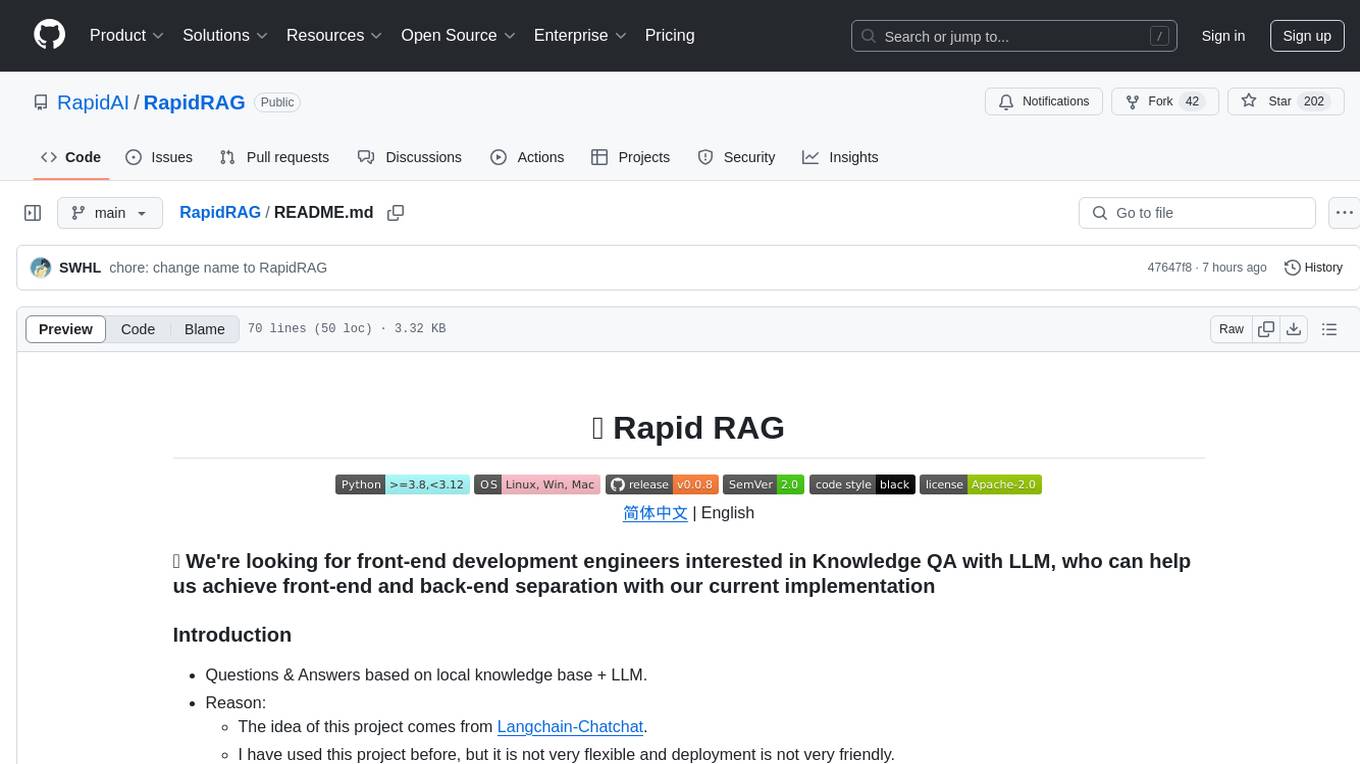
RapidRAG
RapidRAG is a project focused on Knowledge QA with LLM, combining Questions & Answers based on local knowledge base with a large language model. The project aims to provide a flexible and deployment-friendly solution for building a knowledge question answering system. It is modularized, allowing easy replacement of parts and simple code understanding. The tool supports various document formats and can utilize CPU for most parts, with the large language model interface requiring separate deployment.
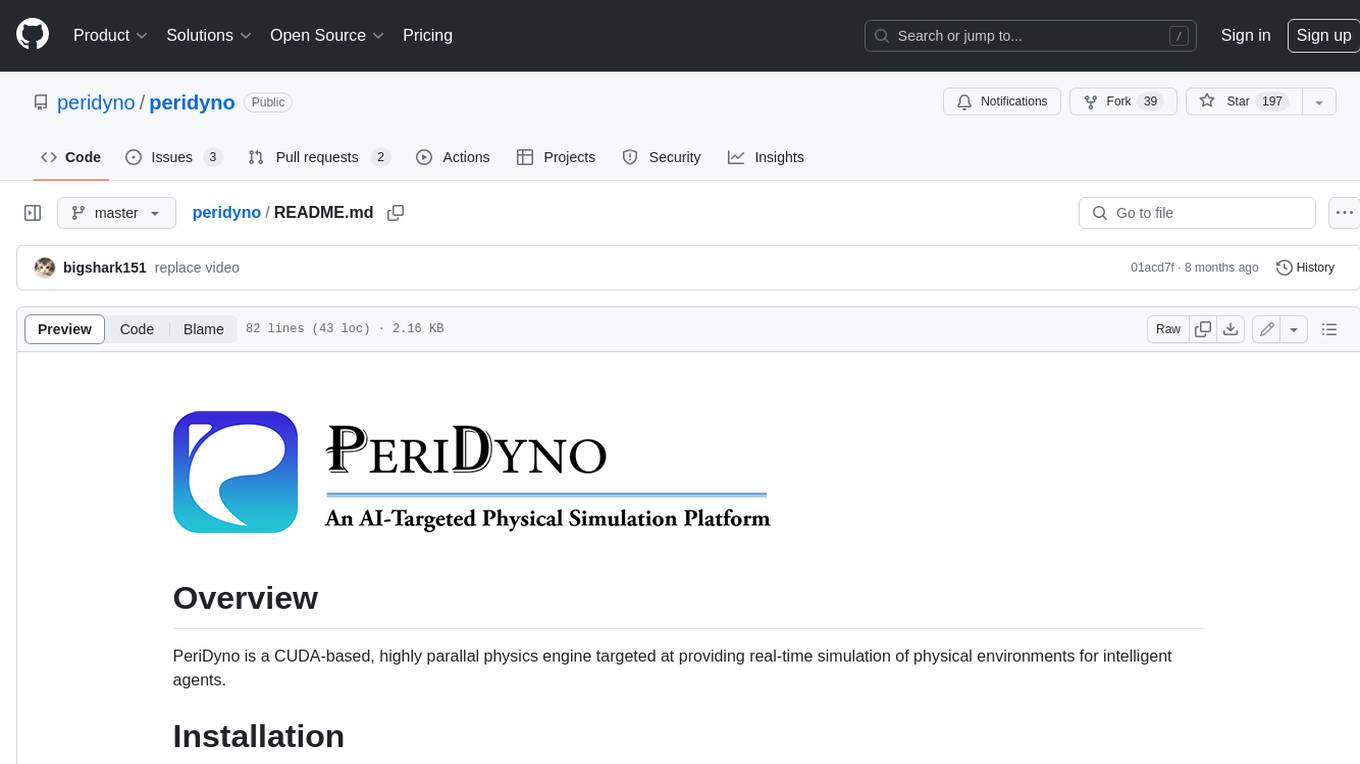
peridyno
PeriDyno is a CUDA-based, highly parallel physics engine targeted at providing real-time simulation of physical environments for intelligent agents. It is designed to be easy to use and integrate into existing projects, and it provides a wide range of features for simulating a variety of physical phenomena. PeriDyno is open source and available under the Apache 2.0 license.
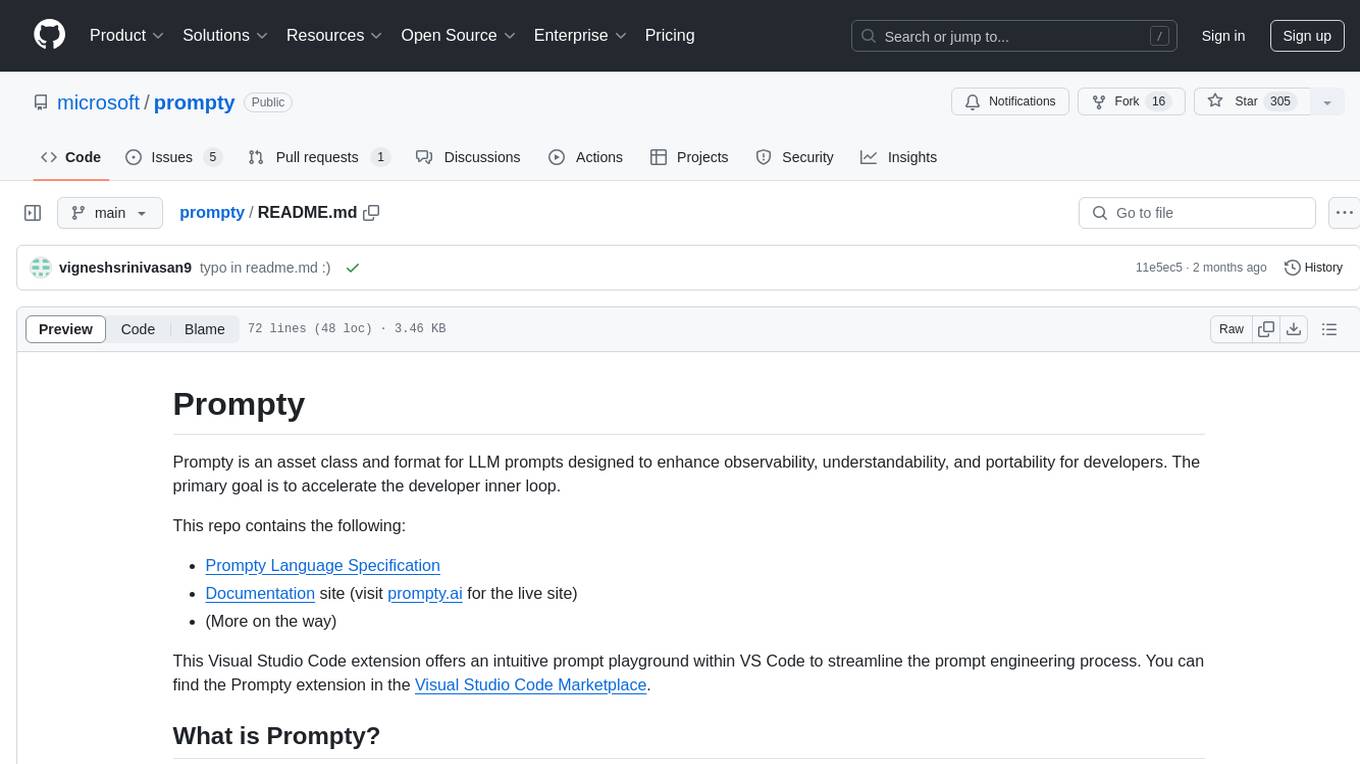
prompty
Prompty is an asset class and format for LLM prompts designed to enhance observability, understandability, and portability for developers. The primary goal is to accelerate the developer inner loop. This repository contains the Prompty Language Specification and a documentation site. The Visual Studio Code extension offers a prompt playground to streamline the prompt engineering process.
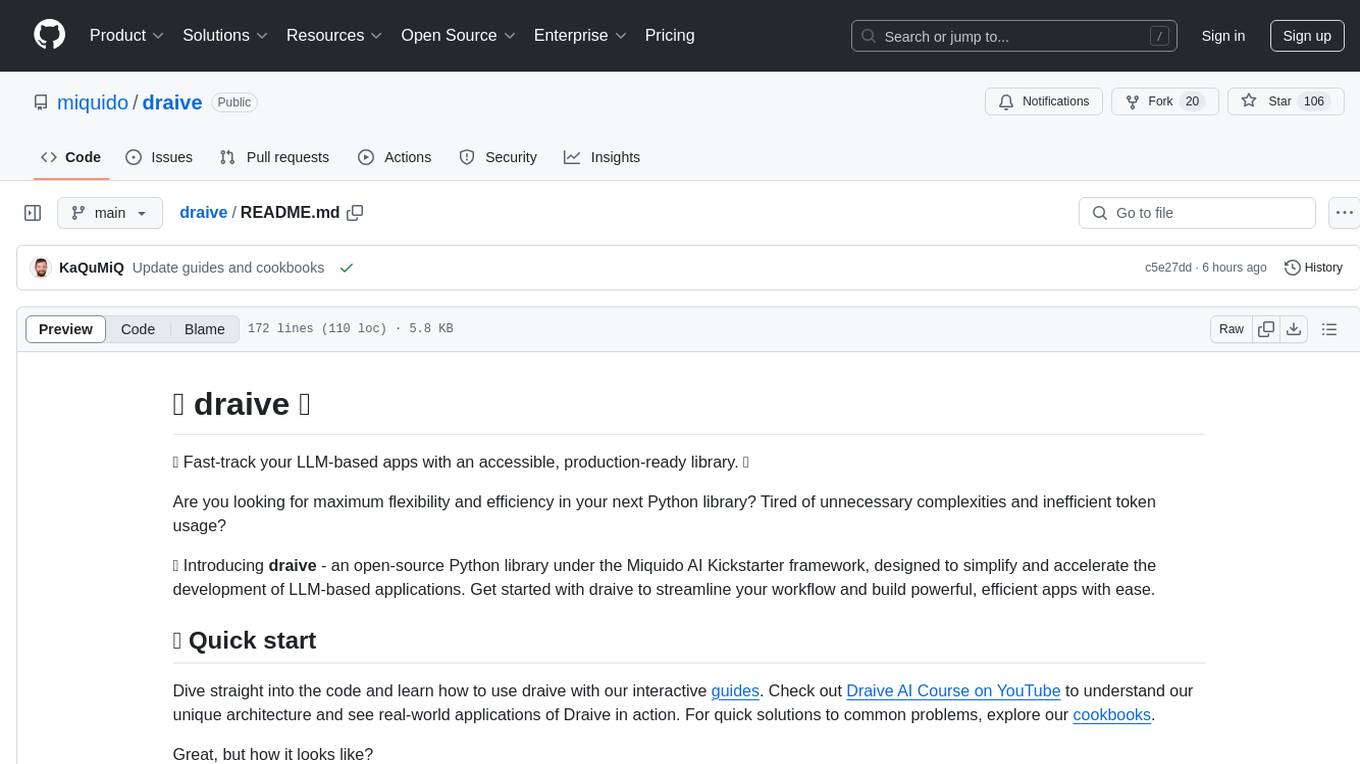
draive
draive is an open-source Python library designed to simplify and accelerate the development of LLM-based applications. It offers abstract building blocks for connecting functionalities with large language models, flexible integration with various AI solutions, and a user-friendly framework for building scalable data processing pipelines. The library follows a function-oriented design, allowing users to represent complex programs as simple functions. It also provides tools for measuring and debugging functionalities, ensuring type safety and efficient asynchronous operations for modern Python apps.
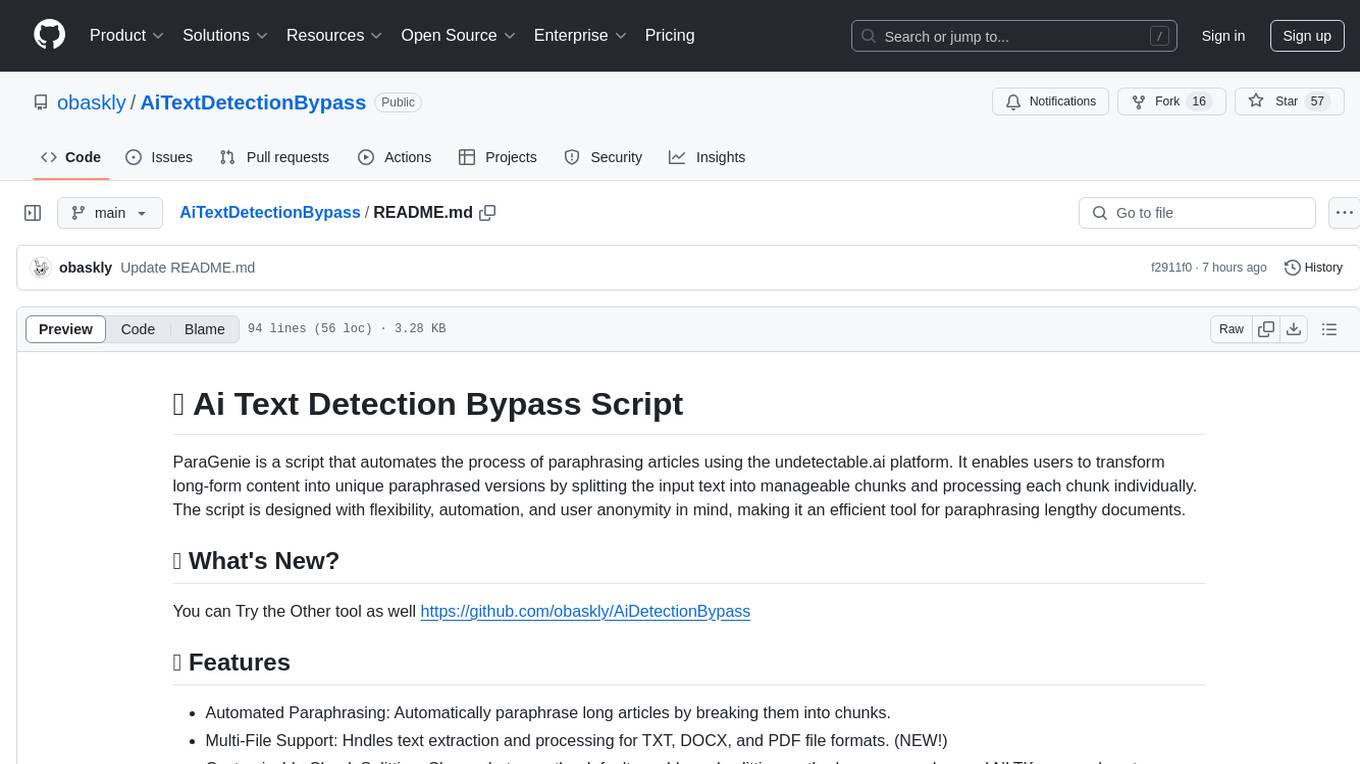
AiTextDetectionBypass
ParaGenie is a script designed to automate the process of paraphrasing articles using the undetectable.ai platform. It allows users to convert lengthy content into unique paraphrased versions by splitting the input text into manageable chunks and processing each chunk individually. The script offers features such as automated paraphrasing, multi-file support for TXT, DOCX, and PDF formats, customizable chunk splitting methods, Gmail-based registration for seamless paraphrasing, purpose-specific writing support, readability level customization, anonymity features for user privacy, error handling and recovery, and output management for easy access and organization of paraphrased content.
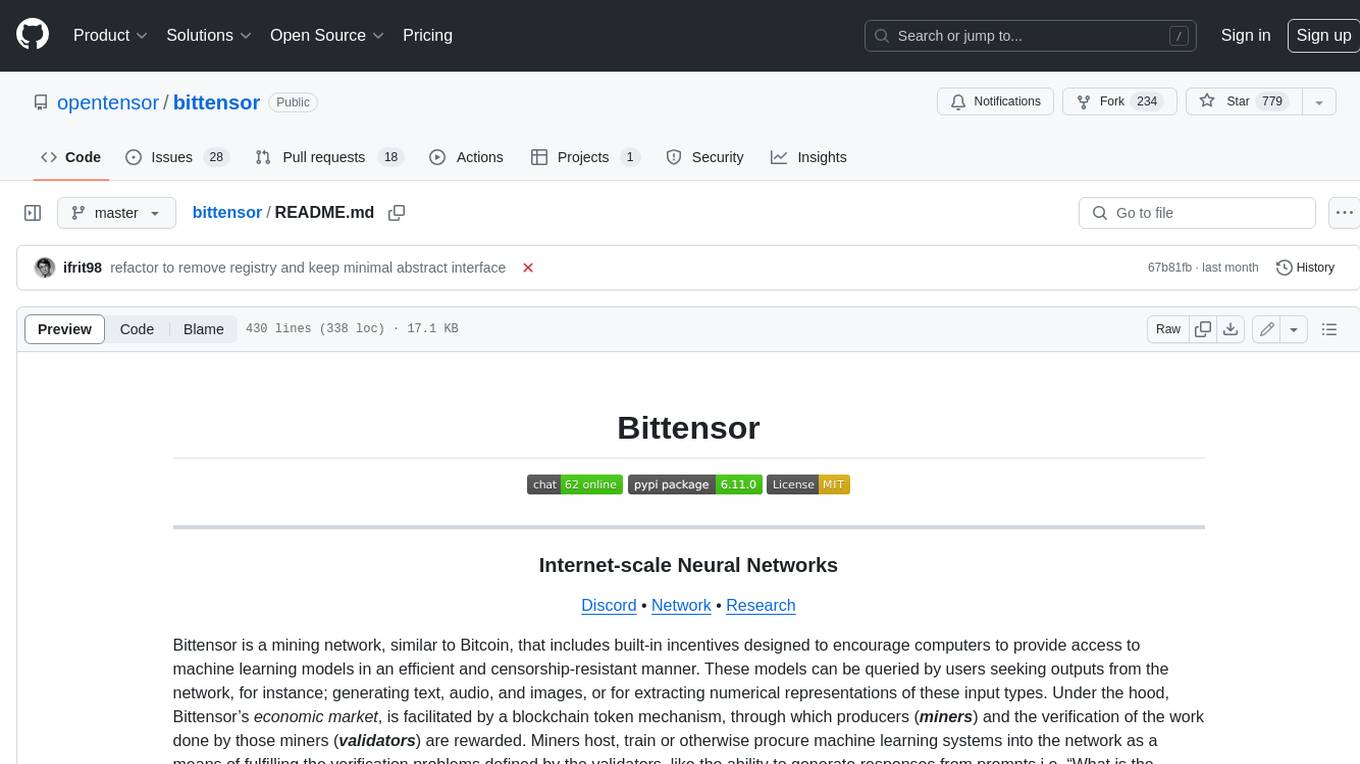
bittensor
Bittensor is an internet-scale neural network that incentivizes computers to provide access to machine learning models in a decentralized and censorship-resistant manner. It operates through a token-based mechanism where miners host, train, and procure machine learning systems to fulfill verification problems defined by validators. The network rewards miners and validators for their contributions, ensuring continuous improvement in knowledge output. Bittensor allows anyone to participate, extract value, and govern the network without centralized control. It supports tasks such as generating text, audio, images, and extracting numerical representations.
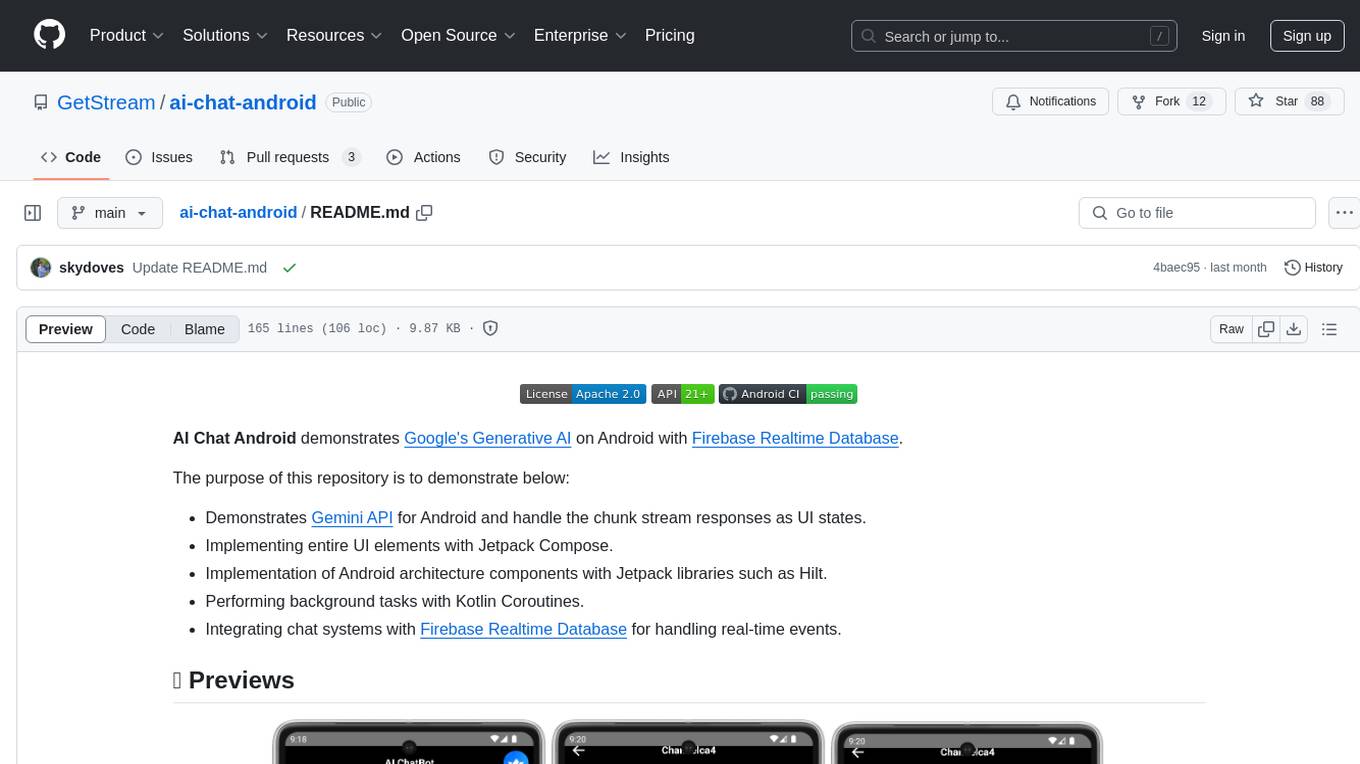
ai-chat-android
AI Chat Android demonstrates Google's Generative AI on Android with Firebase Realtime Database. It showcases Gemini API integration, Jetpack Compose UI elements, Android architecture components with Hilt, Kotlin Coroutines for background tasks, and Firebase Realtime Database integration for real-time events. The project follows Google's official architecture guidance with a modularized structure for reusability, parallel building, and decentralized focusing.
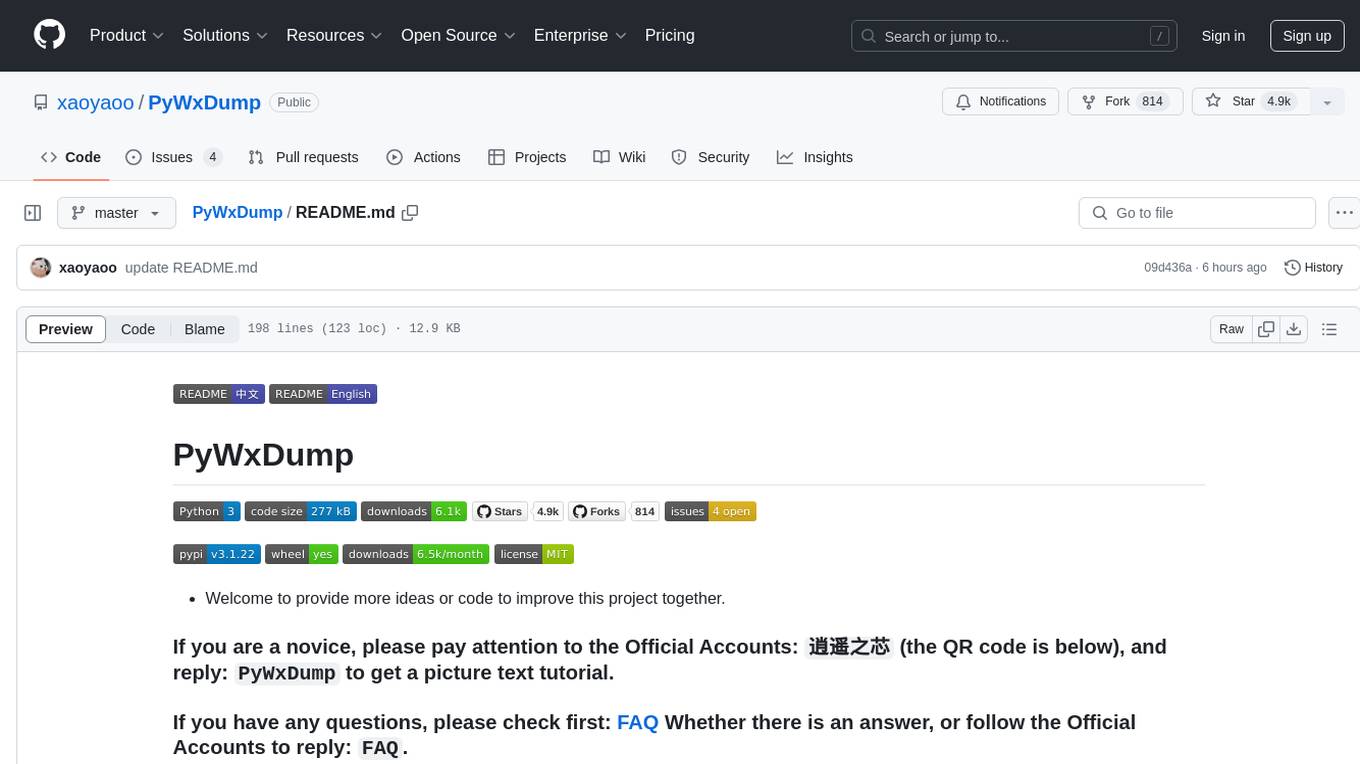
PyWxDump
PyWxDump is a Python tool designed for obtaining WeChat account information, decrypting databases, viewing WeChat chats, and exporting chats as HTML backups. It provides core features such as extracting base address offsets of various WeChat data, decrypting databases, and combining multiple database types for unified viewing. Additionally, it offers extended functions like viewing chat history through the web, exporting chat logs in different formats, and remote viewing of WeChat chat history. The tool also includes document classes for database field descriptions, base address offset methods, and decryption methods for MAC databases. PyWxDump is suitable for network security, daily backup archiving, remote chat history viewing, and more.
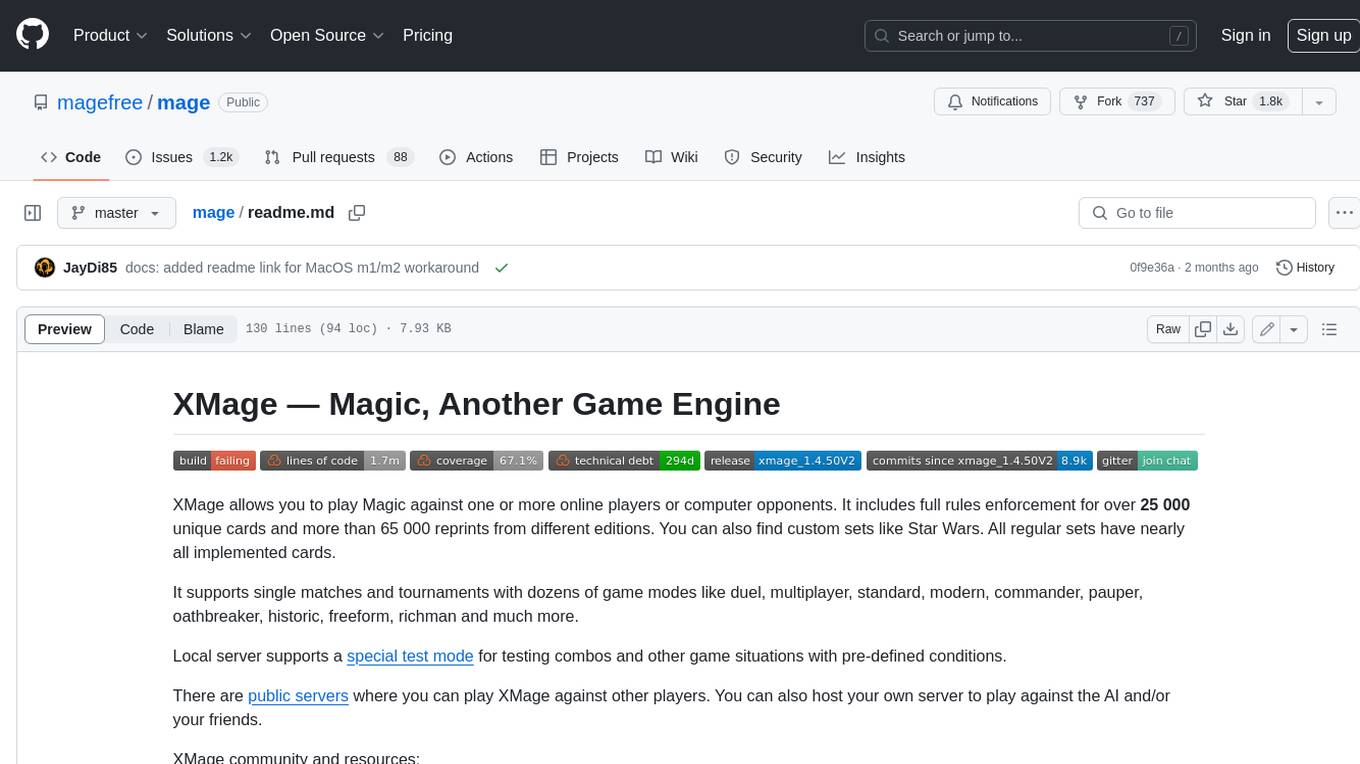
mage
XMage is an open-source, cross-platform application that allows users to play the collectible card game Magic: The Gathering online against other players or computer opponents. It supports over 25,000 unique cards and more than 65,000 reprints from different editions, including custom sets like Star Wars. XMage supports single matches and tournaments with dozens of game modes, including duel, multiplayer, standard, modern, commander, pauper, oathbreaker, historic, freeform, and richman. It also features a deck editor, a player rating system, and support for special formats like Commander, Oathbreaker, Cube, Tiny Leaders, Super Standard, and Historic Standard.

uAgents
uAgents is a Python library developed by Fetch.ai that allows for the creation of autonomous AI agents. These agents can perform various tasks on a schedule or take action on various events. uAgents are easy to create and manage, and they are connected to a fast-growing network of other uAgents. They are also secure, with cryptographically secured messages and wallets.
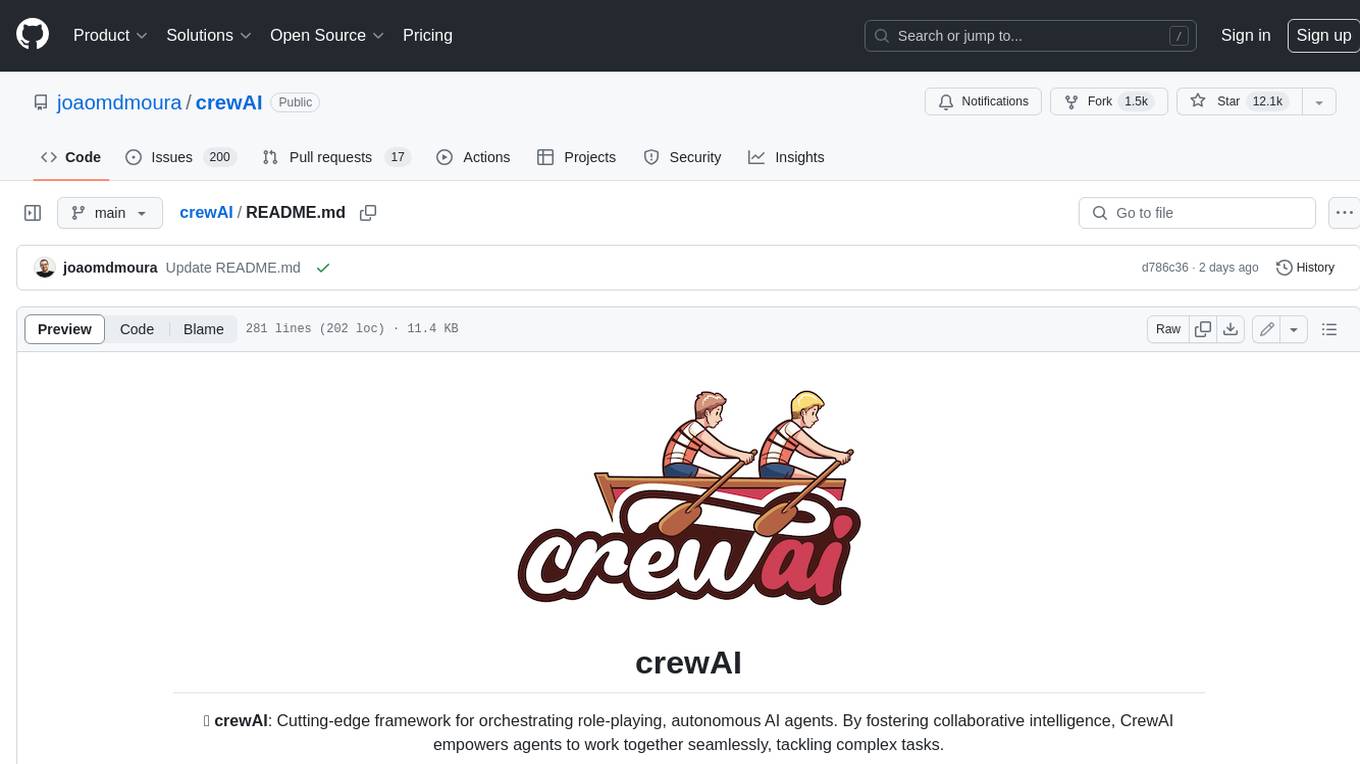
crewAI
crewAI is a cutting-edge framework for orchestrating role-playing, autonomous AI agents. By fostering collaborative intelligence, CrewAI empowers agents to work together seamlessly, tackling complex tasks. It provides a flexible and structured approach to AI collaboration, enabling users to define agents with specific roles, goals, and tools, and assign them tasks within a customizable process. crewAI supports integration with various LLMs, including OpenAI, and offers features such as autonomous task delegation, flexible task management, and output parsing. It is open-source and welcomes contributions, with a focus on improving the library based on usage data collected through anonymous telemetry.
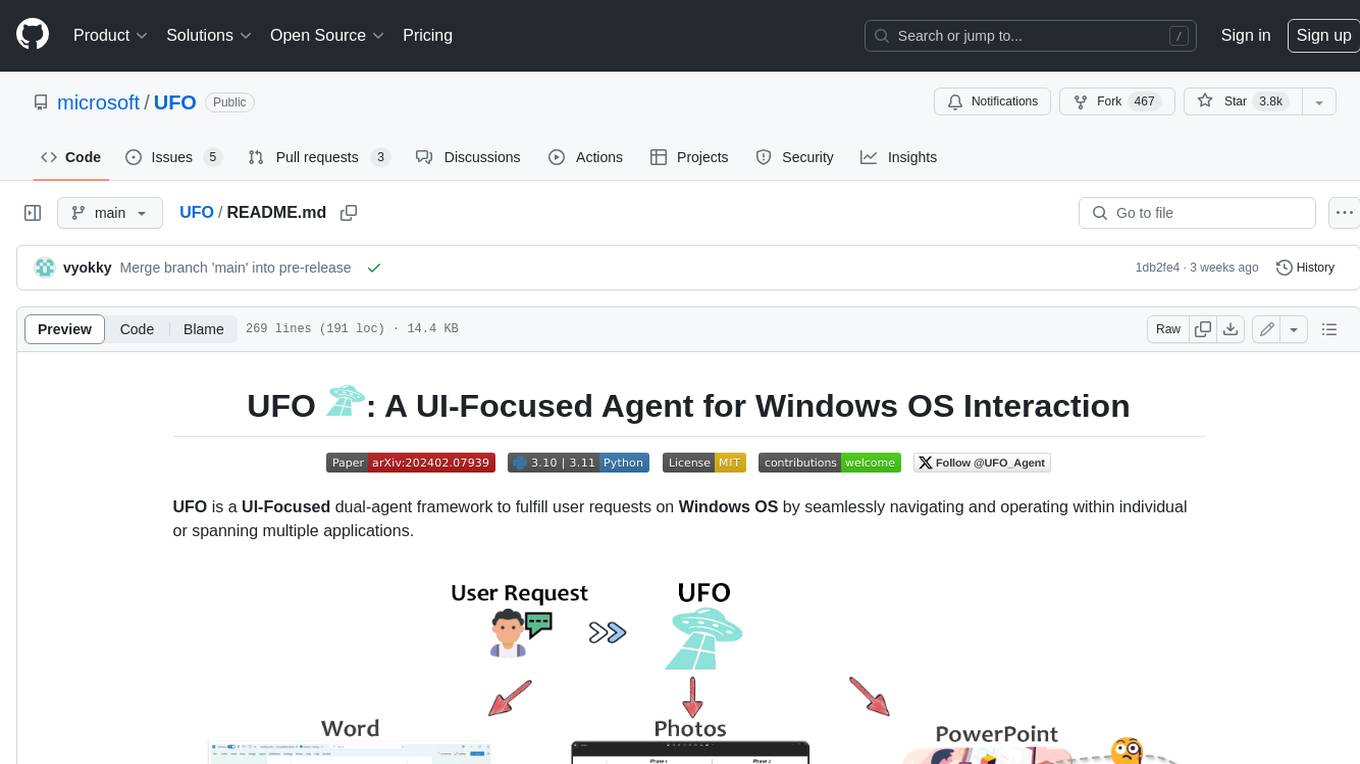
UFO
UFO is a UI-focused dual-agent framework to fulfill user requests on Windows OS by seamlessly navigating and operating within individual or spanning multiple applications.
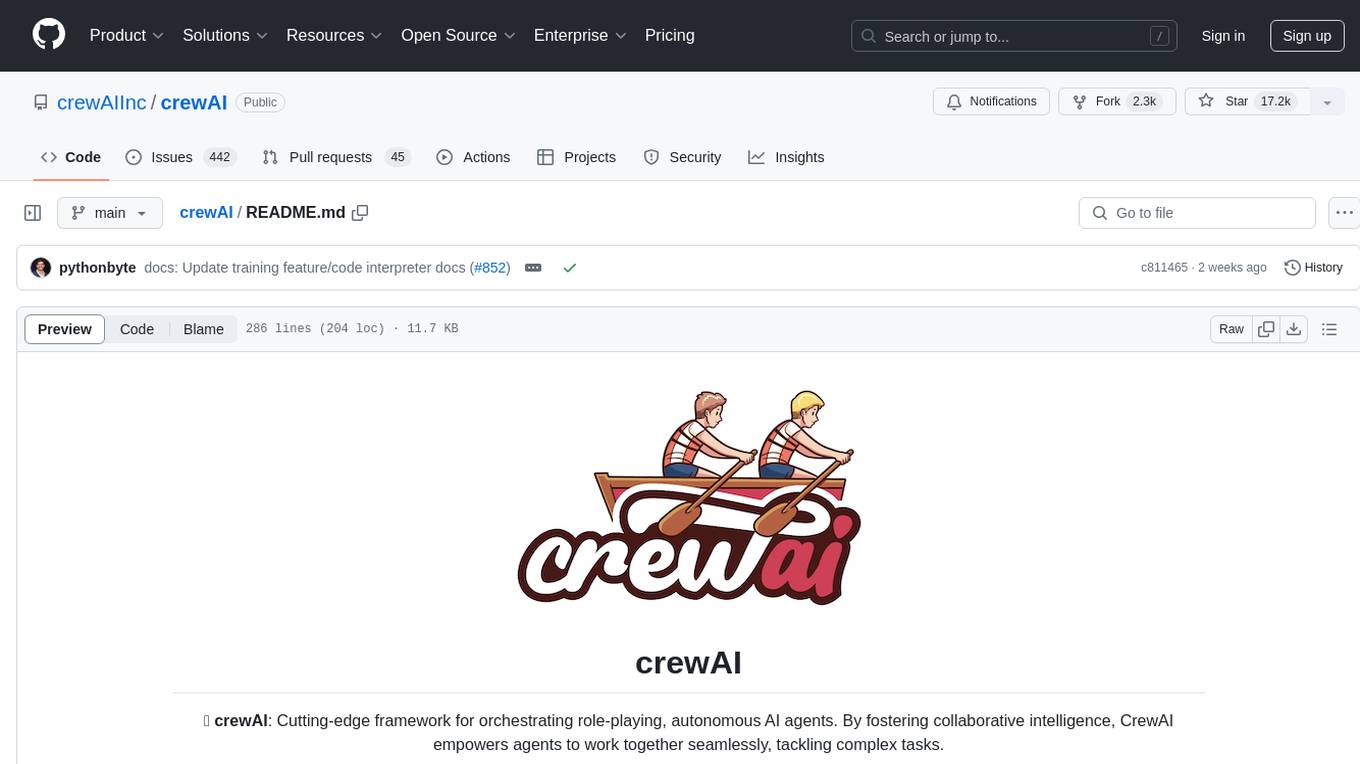
crewAI
CrewAI is a cutting-edge framework designed to orchestrate role-playing autonomous AI agents. By fostering collaborative intelligence, CrewAI empowers agents to work together seamlessly, tackling complex tasks. It enables AI agents to assume roles, share goals, and operate in a cohesive unit, much like a well-oiled crew. Whether you're building a smart assistant platform, an automated customer service ensemble, or a multi-agent research team, CrewAI provides the backbone for sophisticated multi-agent interactions. With features like role-based agent design, autonomous inter-agent delegation, flexible task management, and support for various LLMs, CrewAI offers a dynamic and adaptable solution for both development and production workflows.
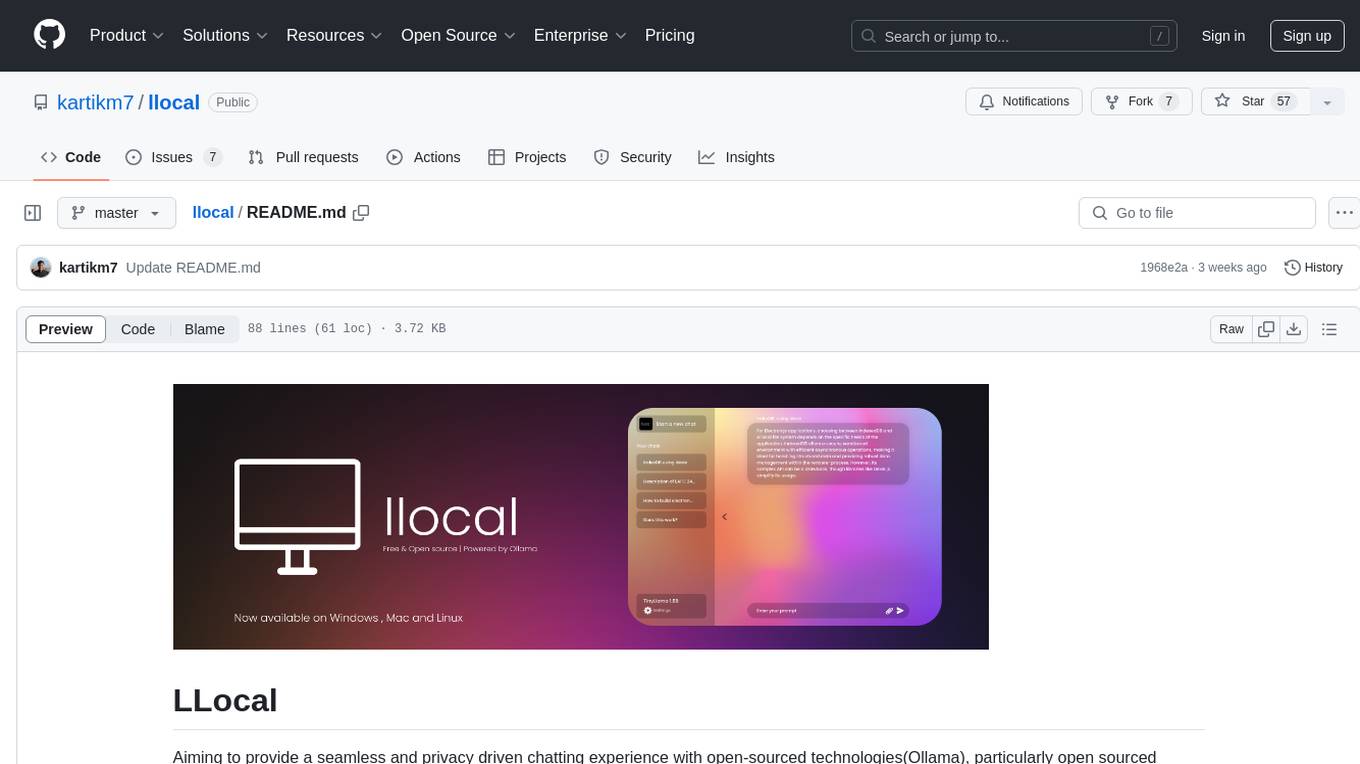
llocal
LLocal is an Electron application focused on providing a seamless and privacy-driven chatting experience using open-sourced technologies, particularly open-sourced LLM's. It allows users to store chats locally, switch between models, pull new models, upload images, perform web searches, and render responses as markdown. The tool also offers multiple themes, seamless integration with Ollama, and upcoming features like chat with images, web search improvements, retrieval augmented generation, multiple PDF chat, text to speech models, community wallpapers, lofi music, speech to text, and more. LLocal's builds are currently unsigned, requiring manual builds or using the universal build for stability.
For similar tasks
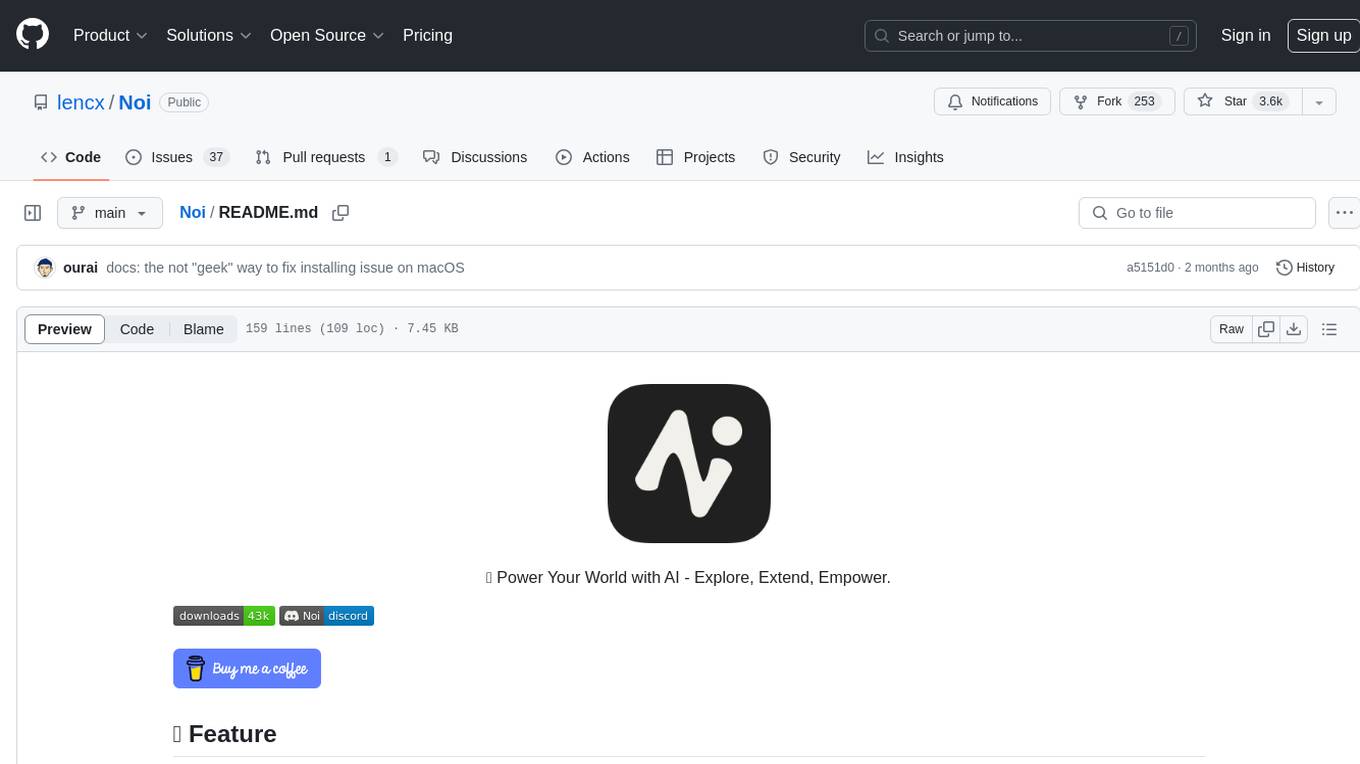
Noi
Noi is an AI-enhanced customizable browser designed to streamline digital experiences. It includes curated AI websites, allows adding any URL, offers prompts management, Noi Ask for batch messaging, various themes, Noi Cache Mode for quick link access, cookie data isolation, and more. Users can explore, extend, and empower their browsing experience with Noi.
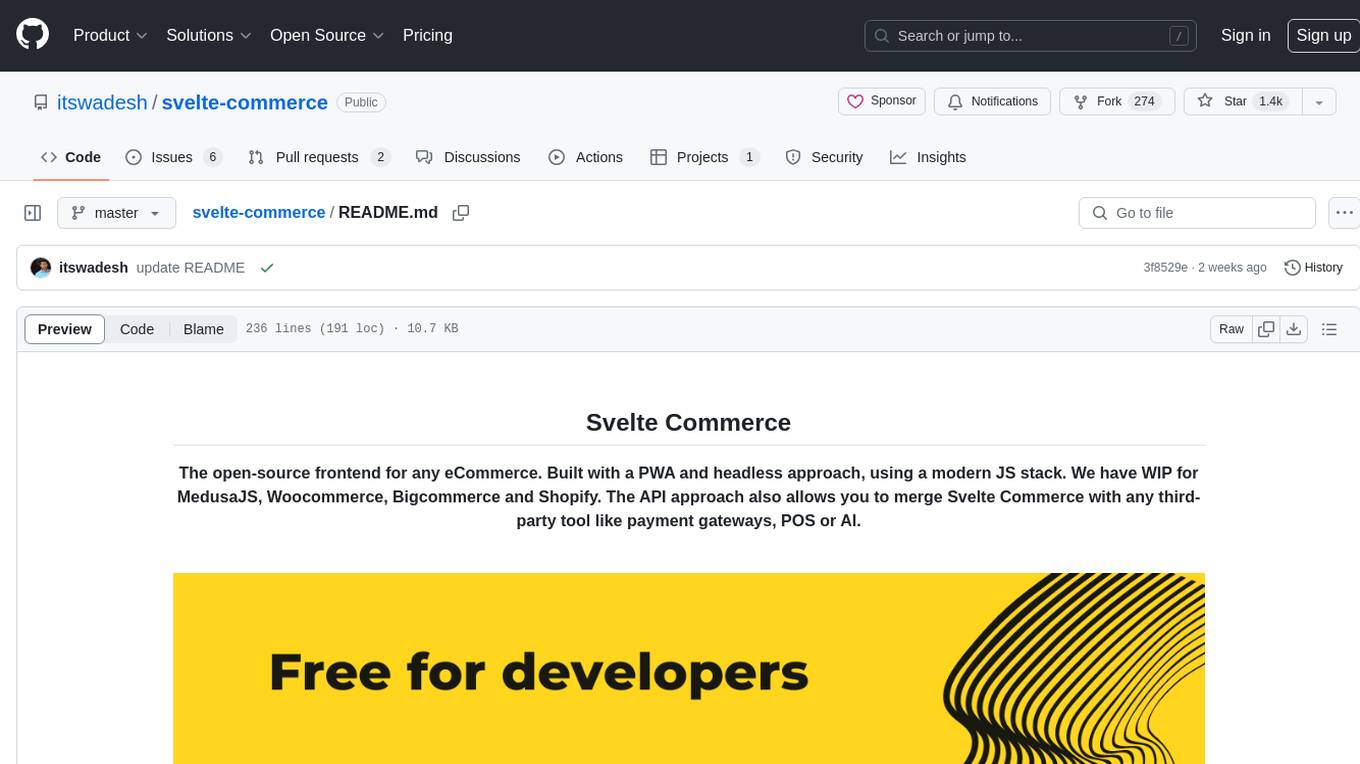
svelte-commerce
Svelte Commerce is an open-source frontend for eCommerce, utilizing a PWA and headless approach with a modern JS stack. It supports integration with various eCommerce backends like MedusaJS, Woocommerce, Bigcommerce, and Shopify. The API flexibility allows seamless connection with third-party tools such as payment gateways, POS systems, and AI services. Svelte Commerce offers essential eCommerce features, is both SSR and SPA, superfast, and free to download and modify. Users can easily deploy it on Netlify or Vercel with zero configuration. The tool provides features like headless commerce, authentication, cart & checkout, TailwindCSS styling, server-side rendering, proxy + API integration, animations, lazy loading, search functionality, faceted filters, and more.
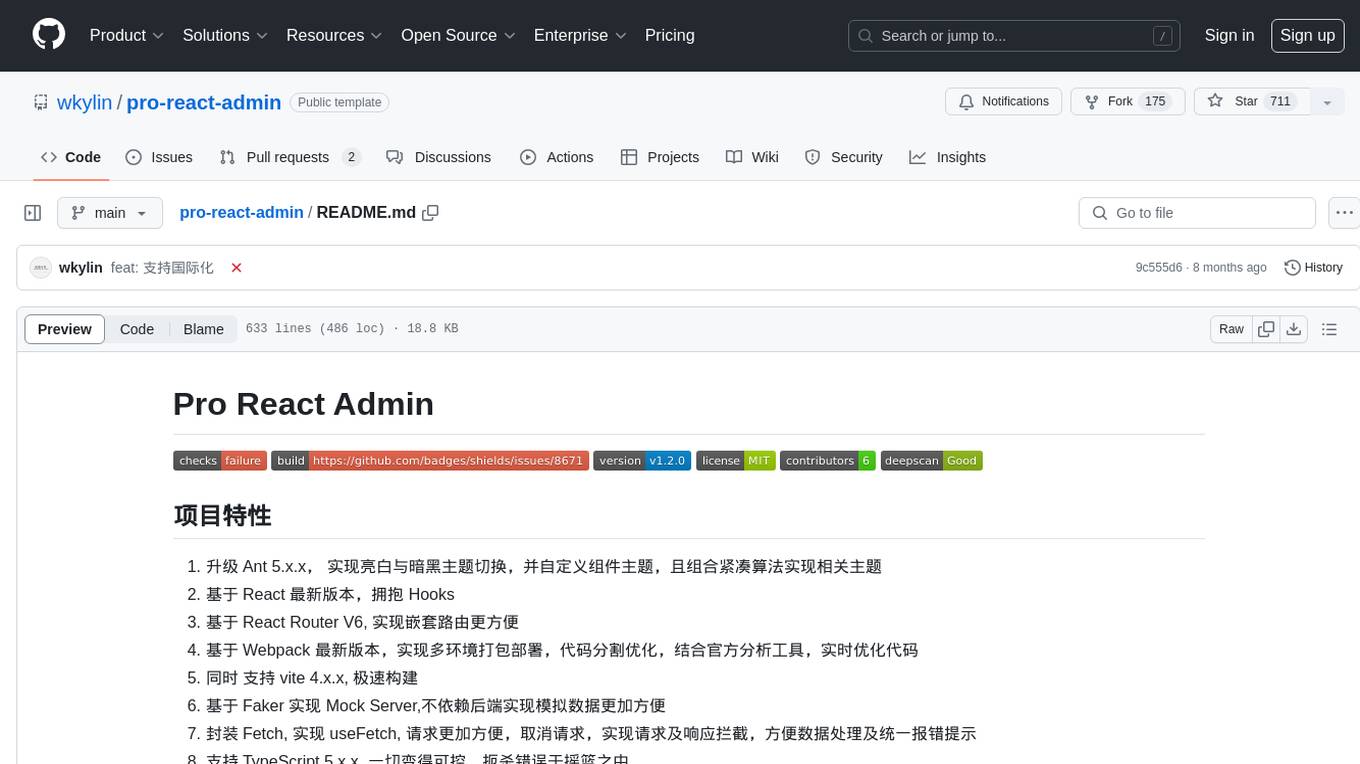
pro-react-admin
Pro React Admin is a comprehensive React admin template that includes features such as theme switching, custom component theming, nested routing, webpack optimization, TypeScript support, multi-tabs, internationalization, code styling, commit message configuration, error handling, code splitting, component documentation generation, and more. It also provides tools for mock server implementation, deployment, linting, formatting, and continuous code review. The template supports various technologies like React, React Router, Webpack, Babel, Ant Design, TypeScript, and Vite, making it suitable for building efficient and scalable React admin applications.
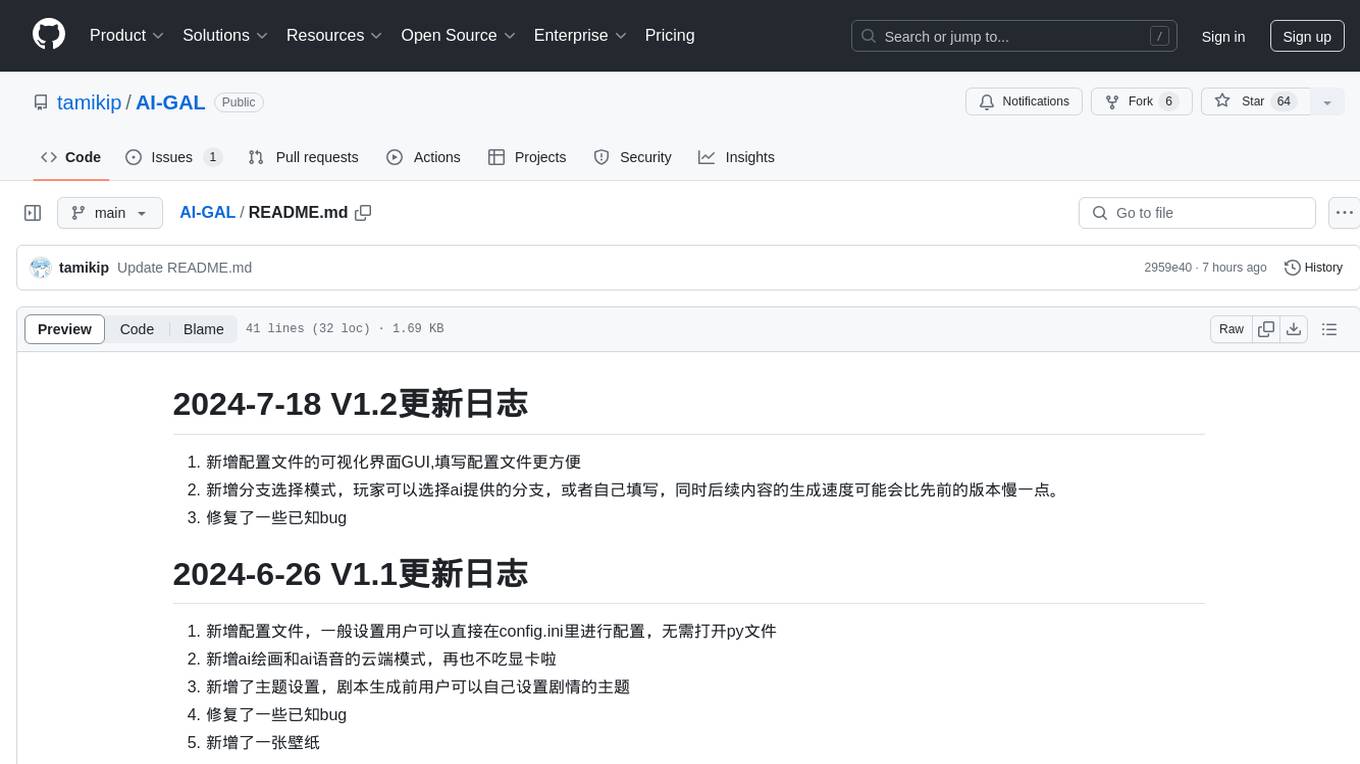
AI-GAL
AI-GAL is a tool that offers a visual GUI for easier configuration file editing, branch selection mode for content generation, and bug fixes. Users can configure settings in config.ini, utilize cloud-based AI drawing and voice modes, set themes for script generation, and enjoy a wallpaper. Prior to usage, ensure a 4GB+ GPU, chatgpt key or local LLM deployment, and installation of stable diffusion, gpt-sovits, and rembg. To start, fill out the config.ini file and run necessary APIs. Restart a storyline by clearing story.txt in the game directory. Encounter errors? Copy the log.txt details and send them for assistance.
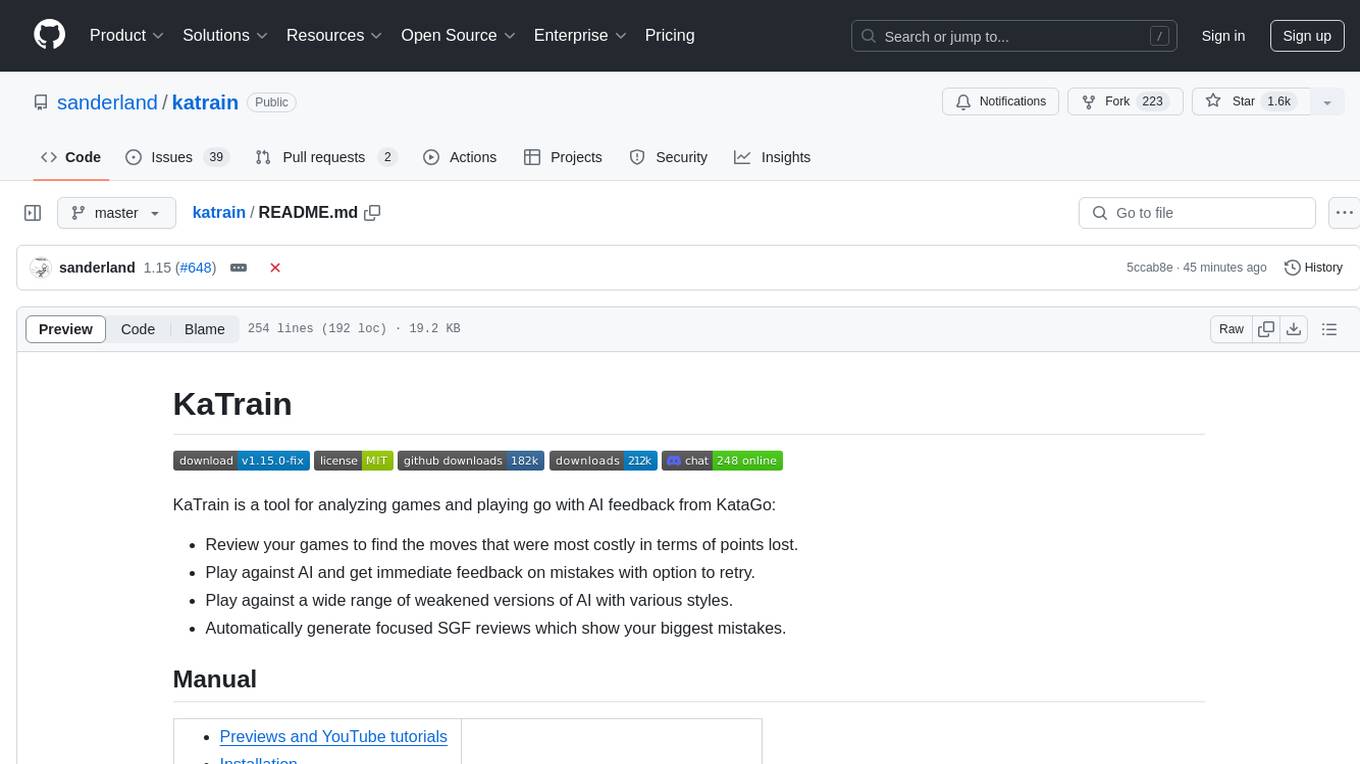
katrain
KaTrain is a tool designed for analyzing games and playing go with AI feedback from KataGo. Users can review their games to find costly moves, play against AI with immediate feedback, play against weakened AI versions, and generate focused SGF reviews. The tool provides various features such as previews, tutorials, installation instructions, and configuration options for KataGo. Users can play against AI, receive instant feedback on moves, explore variations, and request in-depth analysis. KaTrain also supports distributed training for contributing to KataGo's strength and training bigger models. The tool offers themes customization, FAQ section, and opportunities for support and contribution through GitHub issues and Discord community.
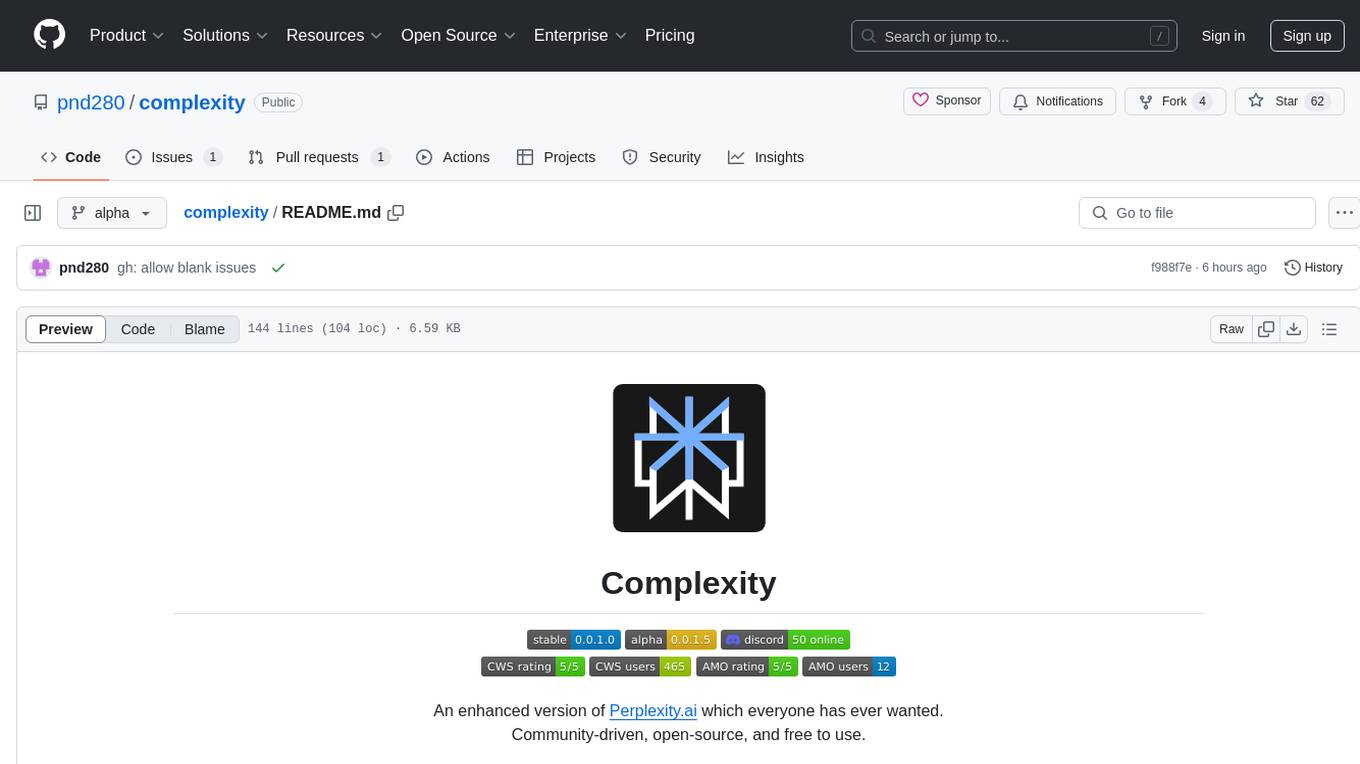
complexity
Complexity is a community-driven, open-source, and free third-party extension that enhances the features of Perplexity.ai. It provides various UI/UX/QoL tweaks, LLM/Image gen model selectors, a customizable theme, and a prompts library. The tool intercepts network traffic to alter the behavior of the host page, offering a solution to the limitations of Perplexity.ai. Users can install Complexity from Chrome Web Store, Mozilla Add-on, or build it from the source code.
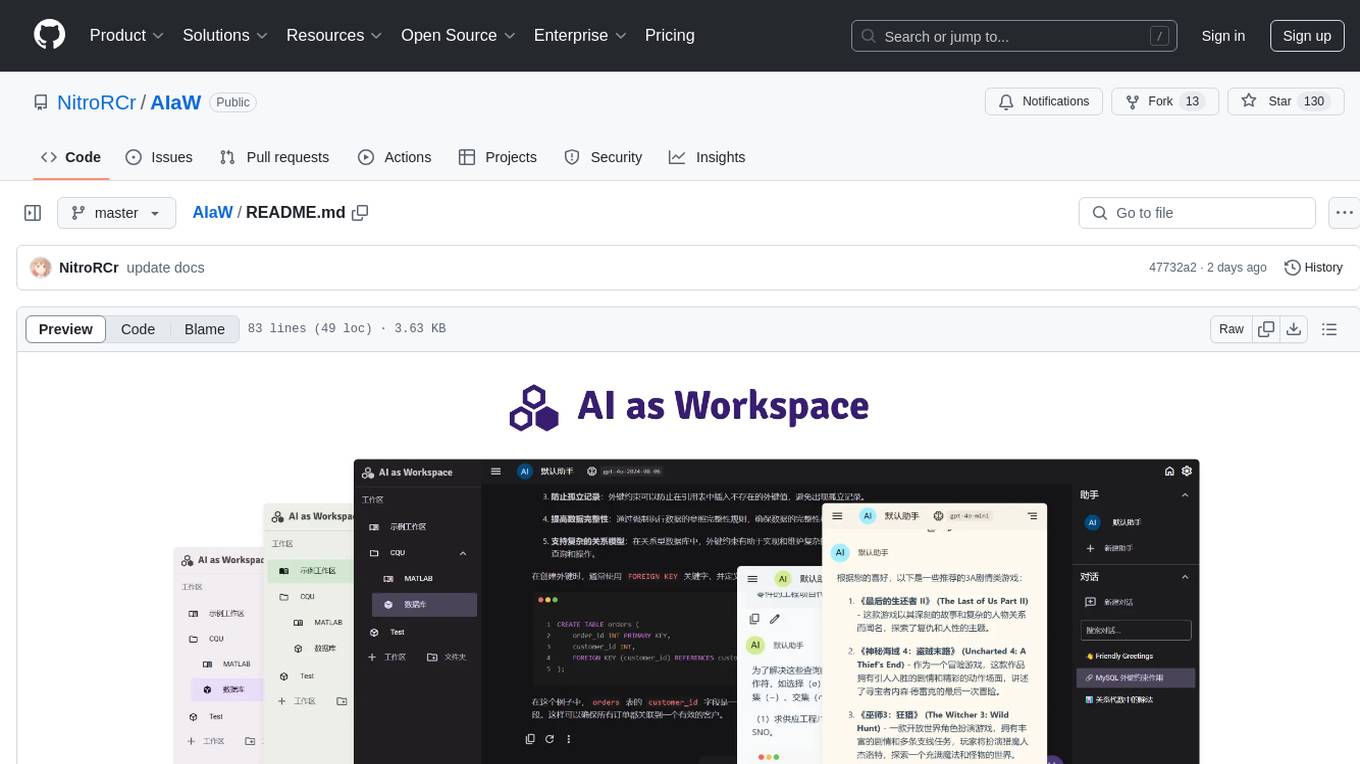
AIaW
AIaW is a next-generation LLM client with full functionality, lightweight, and extensible. It supports various basic functions such as streaming transfer, image uploading, and latex formulas. The tool is cross-platform with a responsive interface design. It supports multiple service providers like OpenAI, Anthropic, and Google. Users can modify questions, regenerate in a forked manner, and visualize conversations in a tree structure. Additionally, it offers features like file parsing, video parsing, plugin system, assistant market, local storage with real-time cloud sync, and customizable interface themes. Users can create multiple workspaces, use dynamic prompt word variables, extend plugins, and benefit from detailed design elements like real-time content preview, optimized code pasting, and support for various file types.
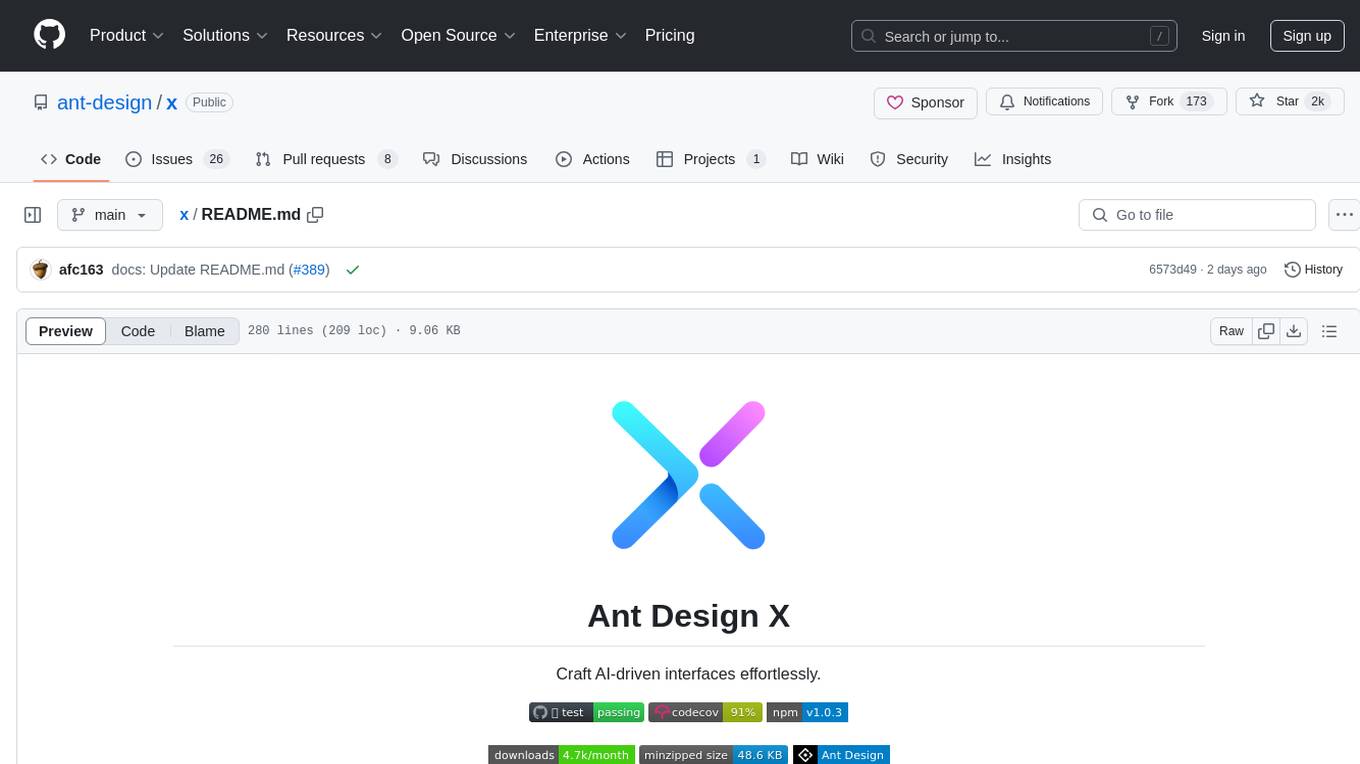
x
Ant Design X is a tool for crafting AI-driven interfaces effortlessly. It is built on the best practices of enterprise-level AI products, offering flexible and diverse atomic components for various AI dialogue scenarios. The tool provides out-of-the-box model integration with inference services compatible with OpenAI standards. It also enables efficient management of conversation data flows, supports rich template options, complete TypeScript support, and advanced theme customization. Ant Design X is designed to enhance development efficiency and deliver exceptional AI interaction experiences.
For similar jobs
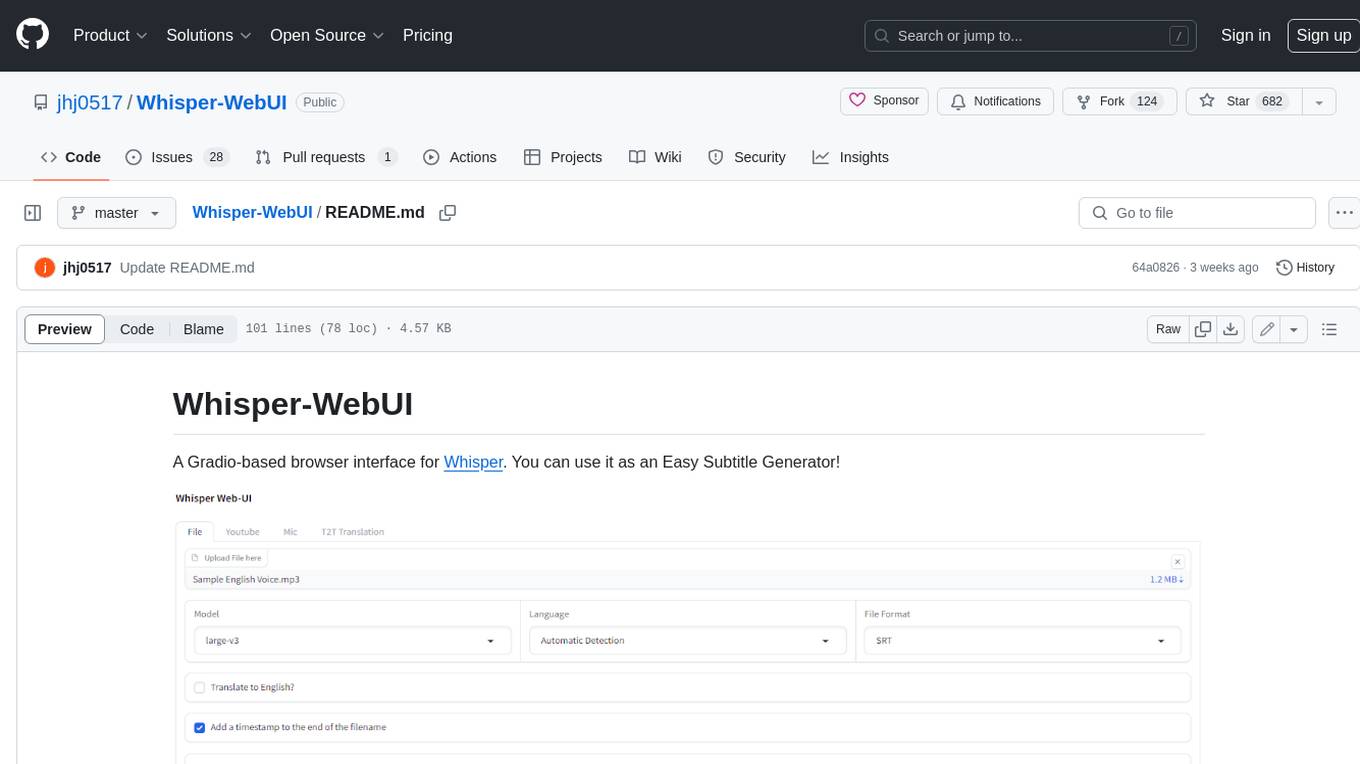
Whisper-WebUI
Whisper-WebUI is a Gradio-based browser interface for Whisper, serving as an Easy Subtitle Generator. It supports generating subtitles from various sources such as files, YouTube, and microphone. The tool also offers speech-to-text and text-to-text translation features, utilizing Facebook NLLB models and DeepL API. Users can translate subtitle files from other languages to English and vice versa. The project integrates faster-whisper for improved VRAM usage and transcription speed, providing efficiency metrics for optimized whisper models. Additionally, users can choose from different Whisper models based on size and language requirements.
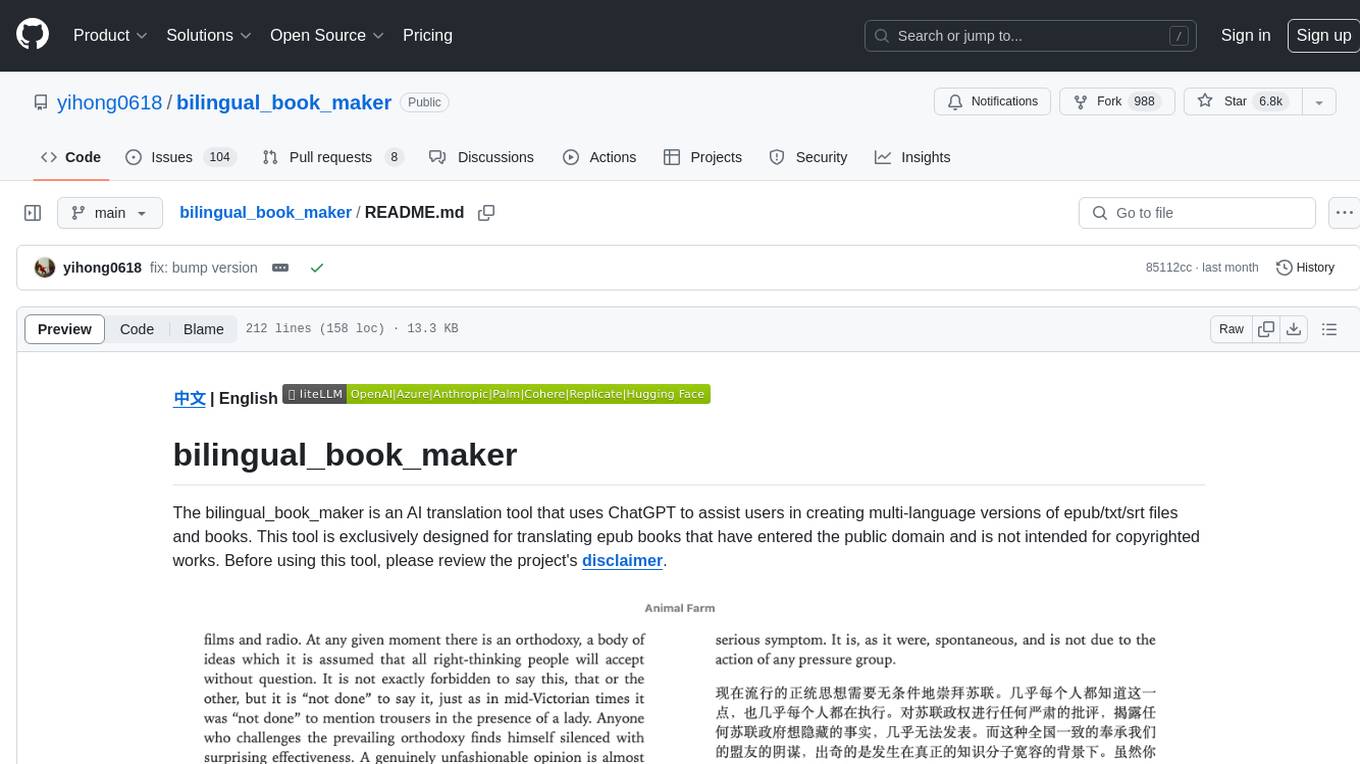
bilingual_book_maker
The bilingual_book_maker is an AI translation tool that uses ChatGPT to assist users in creating multi-language versions of epub/txt/srt files and books. It supports various models like gpt-4, gpt-3.5-turbo, claude-2, palm, llama-2, azure-openai, command-nightly, and gemini. Users need ChatGPT or OpenAI token, epub/txt books, internet access, and Python 3.8+. The tool provides options to specify OpenAI API key, model selection, target language, proxy server, context addition, translation style, and more. It generates bilingual books in epub format after translation. Users can test translations, set batch size, tweak prompts, and use different models like DeepL, Google Gemini, Tencent TranSmart, and more. The tool also supports retranslation, translating specific tags, and e-reader type specification. Docker usage is available for easy setup.
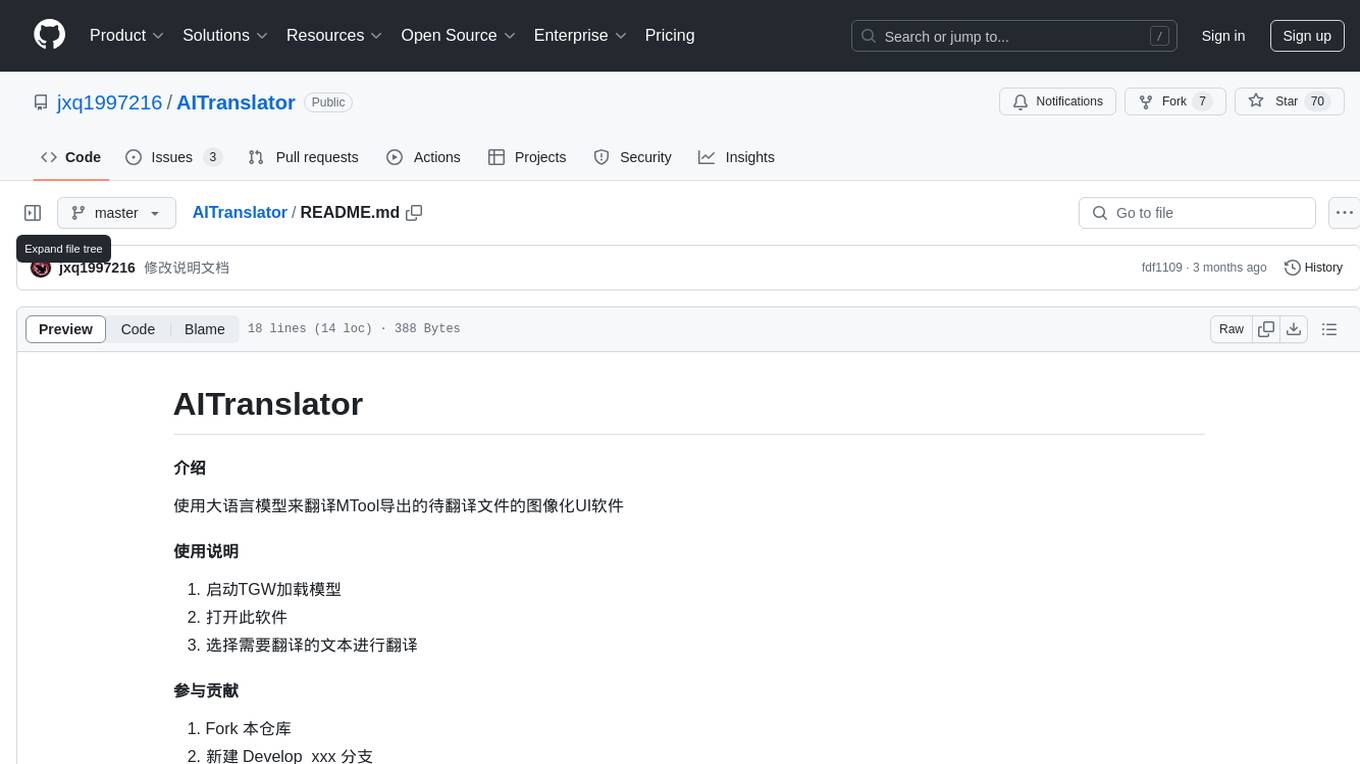
AITranslator
AITranslator is a software tool that utilizes a large language model to translate text from images exported by MTool into a user-friendly graphical interface. Users can start TGW to load the model, open the software, and select the text to be translated. The tool aims to simplify the translation process by leveraging advanced language processing capabilities.
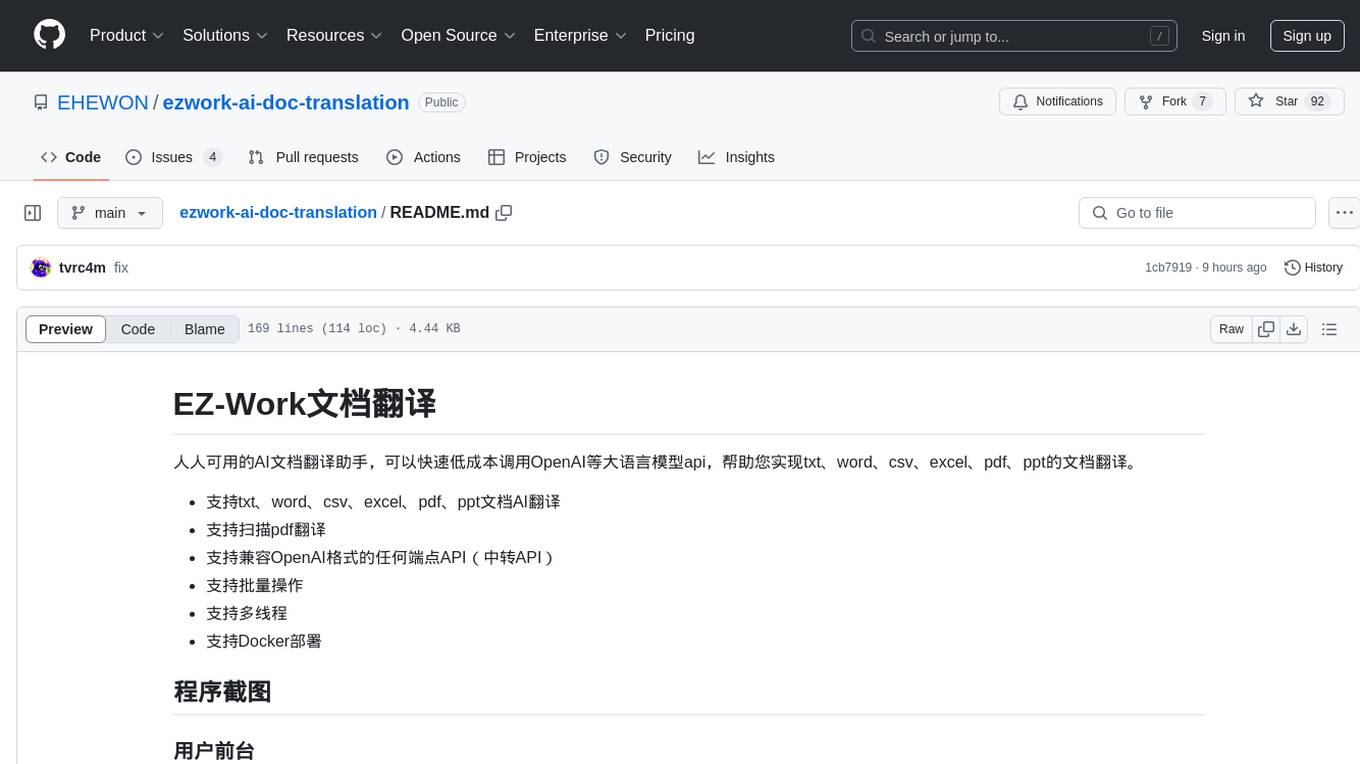
ezwork-ai-doc-translation
EZ-Work AI Document Translation is an AI document translation assistant accessible to everyone. It enables quick and cost-effective utilization of major language model APIs like OpenAI to translate documents in formats such as txt, word, csv, excel, pdf, and ppt. The tool supports AI translation for various document types, including pdf scanning, compatibility with OpenAI format endpoints via intermediary API, batch operations, multi-threading, and Docker deployment.
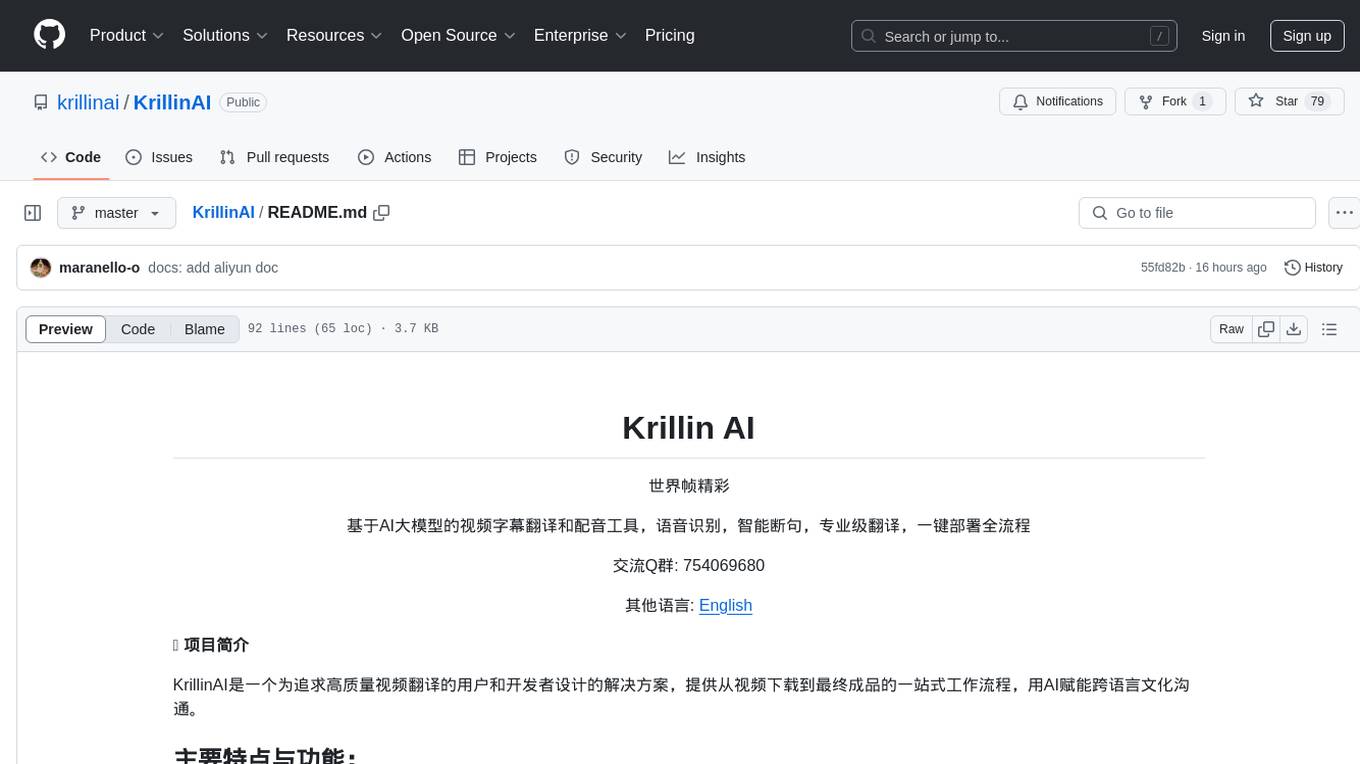
KrillinAI
KrillinAI is a video subtitle translation and dubbing tool based on AI large models, featuring speech recognition, intelligent sentence segmentation, professional translation, and one-click deployment of the entire process. It provides a one-stop workflow from video downloading to the final product, empowering cross-language cultural communication with AI. The tool supports multiple languages for input and translation, integrates features like automatic dependency installation, video downloading from platforms like YouTube and Bilibili, high-speed subtitle recognition, intelligent subtitle segmentation and alignment, custom vocabulary replacement, professional-level translation engine, and diverse external service selection for speech and large model services.

Transtation-KMP
Transtation is an easy-to-use and powerful translation software for Android/Desktop based on Kotlin Multiplatform + Compose Multiplatform. It allows users to translate one item using multiple engines simultaneously, utilize advanced Large Language Models for translation, chat with LLMs for translation, translate long text, support plugin development, image translation, and screen translation. The application is designed for Chinese users and serves as a reference for learning Jetpack Compose or Compose Multiplatform. It features Kotlin Multiplatform, Compose Multiplatform, MVVM, Kotlin Coroutine, Flow, SqlDelight, synchronized translation with multiple engines, plugin development, and makes use of Kotlin language features like lazy loading, Coroutine, sealed classes, and reflection. The application gradually adapts to Android13 with features like setting application language separately and supporting Monet icon.
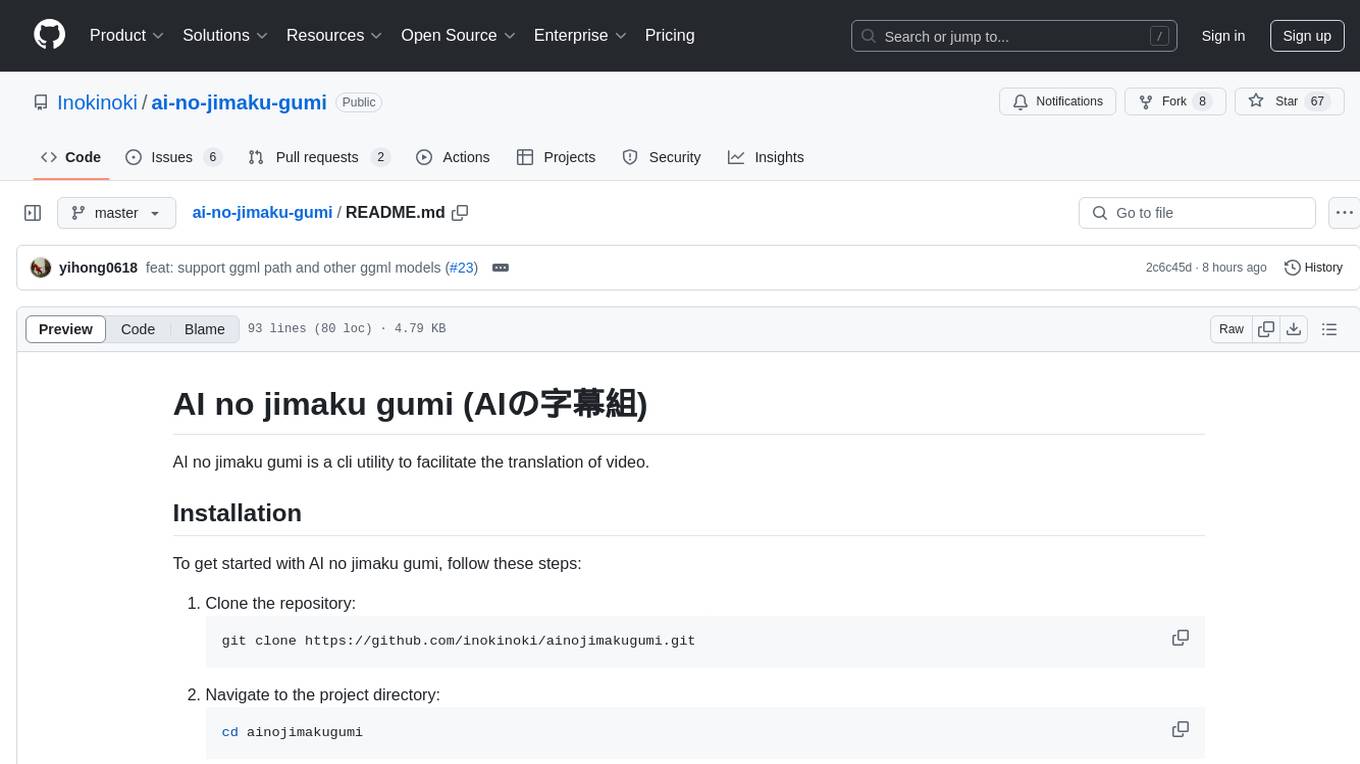
ai-no-jimaku-gumi
AI no jimaku gumi is a command-line utility designed to assist in video translation. It supports translating subtitles using AI models and provides options for different translation and subtitle sources. Users can easily set up the tool by following the installation steps and use it to translate videos to different languages with customizable settings. The tool currently supports DeepL and llm translation backends and SRT subtitle export. It aims to simplify the process of adding subtitles to videos by leveraging AI technology.
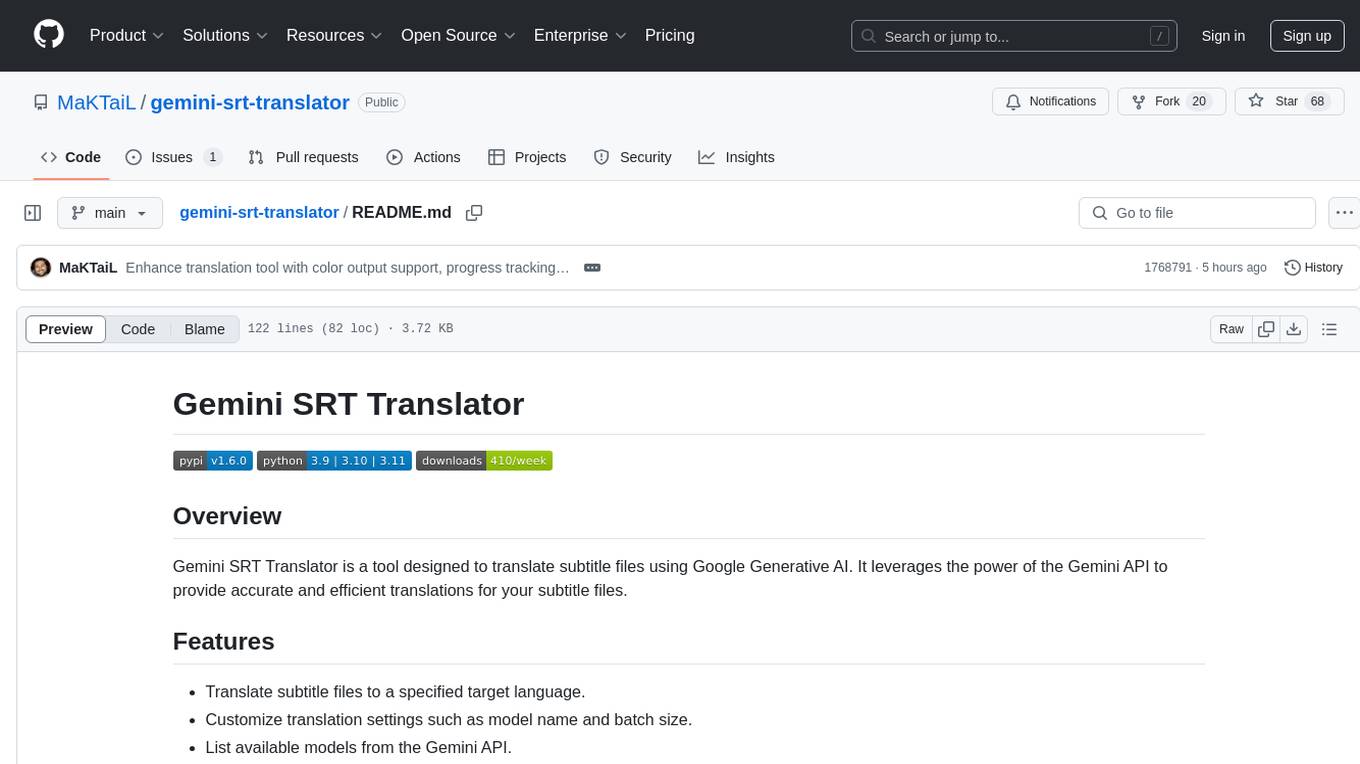
gemini-srt-translator
Gemini SRT Translator is a tool that utilizes Google Generative AI to provide accurate and efficient translations for subtitle files. Users can customize translation settings, such as model name and batch size, and list available models from the Gemini API. The tool requires a free API key from Google AI Studio for setup and offers features like translating subtitles to a specified target language and resuming partial translations. Users can further customize translation settings with optional parameters like gemini_api_key2, output_file, start_line, model_name, batch_size, and more.



